#also these very specific examples don’t apply to everyone who does some variation of those things
Text
nobody tells you how lonely protecting your peace can be or how necessary it becomes the more life you experience
#like was someone supposed to warn me I’d have to lose friends to calorie counting and hustle culture#I can love you endlessly but if you push that shit on me we aren’t hanging out#personalish#also these very specific examples don’t apply to everyone who does some variation of those things
24 notes
·
View notes
Text
Everyone in the slasher community listen up…
STOP INFANTILISING AND FETISHISING AUTISTIC CODED SLASHERS FOR THEIR AUTISTIC TRAITS.
Warnings-Talk of abuse & Trauma
My examples for this will be:
•Billy Lenz (1974 specifically but it applies to all variations of him)
•and Bubba Sawyer/Leatherface
but there are of course,more cases of this with other characters.
I’ll first explain why this is a big problem irl so that I’m not hit with ‘but they’re fictional’.
And I’m clarifying that this is to do with people fetishising and babying them BECAUSE They’re autistic coded or finding their autistic traits ‘Cute’ or as a way to infantilise them (not that I agree with doing it either way).
Doing this to characters who are heavily autistic coded and display autistic traits can be not only very uncomfortable for autistic individuals but it also contributes to the idea that you should baby people with autism and that they can’t do anything for themselves.
It also stereotypes autistic people in a way that if you don’t act like that people can claim that ‘you’re not autistic because you don’t act like it’ making it increasingly harder for Specifically AFAB (assigned female at birth) people to get a diagnosis.It leaves an impression on a neuro-typicals’ brain that this is how autistic people should be treated,which isn’t true.
It’s very uncomfortable to see people baby,infantilise and fetishise characters that share many traits of autism and for me at least,I display some of those traits too,it’s weird to see that.And that in this case, these people are serial killers.They can do things themselves very easily and shouldn’t be babied the way I’ve seen some people do.
All of this just feeds into the (very wrong) social belief that autistic people are less competent than everyone else or that their mentality will always be child-like and by extension always needing to be cared for.
Now I’ll give my examples and a brief analysis on each character and ways that people display these actions and sentiments towards them and by extension the autistic community.
Billy Lenz-
Billy is heavily autistic coded and also displays signs of trauma responses and other mental illnesses.If you watch the original movie it’s very clear why I say that he’s autistic coded.I’ve seen many people either treat him like a baby that so desperately needs to be protected or they fetishise it by making those traits (Like the meltdowns or the way he acts somewhat ‘child-like’ in response to his years of trauma) into him being ‘Cute and submissive’ and that’s very wrong.Yes,he wouldn’t mentally act his age and that’s not even because of autism but just because of trauma,his lack of childhood caused him to regress back into a more immature state of mind to cope,with the exceptions of the first phone call buts that’s a whole other thing,the rest of those calls are him acting out his traumatic childhood.I’ve seen people talk about him saying ‘mommy’ in some of his calls was hot,no it’s not.He was displaying himself as an autistic child about to be heavily and violently abused and calling out for his mother.In what way does that sound appealing? So yeah don’t fetishise his autistic or trauma traits.
Bubba Sawyer-
THIS ONE.This is the most common one to see.A lot of people treat Bubba like this innocent little baby who’s so cute and pure that needs to be protected, like no.He can take care of himself just fine,Yes he may have issues speaking up and he’s not as bad or ruthless as his family because he was pressured into doing what he does and doesn’t do it because he wants to,he just wants to make his family happy.He’s non verbal with very little to no linguistic skills and the closest we get is him babbling as the only way to express emotions other than his masks.These are common autistic traits that are always infantilised in real life as well,being non-verbal is seen as being child-like and not being able to do anything when that is just not true.And just because he displays traits of autism,a speech disorder and possibly a social disorder it doesn’t equal being ‘submissive’.
Just don’t do this.You can still write them in a softer light,I do that.But there’s a big difference between putting them,as characters,in a more positive,soft and loving light and treating them like children because of autism coding.
Anyway, thanks for reading my small rant on this,if you did get to the end :)
#autistic#autism#actually autistic#my rants#billy lenz black christmas#billy lenz#x reader#horror#fanfic#slasher#slasher community#bubba sawyer#leatherface#texas chainsaw massacre#tcm#black christmas 1974#black christmas#billy lenz 1974#horror movies
736 notes
·
View notes
Text
Ask Answers: April 13th, 2021
And we’re back again with more replies so soon, haha. Thank you for the asks!
Your game literally saved me this hell ass year. Thank you so much for the most perfect piece of art I've ever laid eyes on 😫 ... Do you guys have a rough idea when step 3 DLC will be released? I hope I'm not coming off as rude. I just really really love your game.
I’m sorry for the late reply on this! You might’ve already seen the answer by now, but the Step 3 DLC is coming out on the 16th. We’re almost there :D
This may be a silly question but did Jeremy's parents ever find out that Pran had lied about his age and if so, when/how? :3
Pran came clean to them after a couple of years, when he felt secure enough that it wouldn’t ruin the relationship. The Kings were a little embarrassed, the dad more than the mom, but they’re quite good at brushing past those kind of mistakes so it was all water under the bridge pretty fast.
hi! i know you’ve answered a question about alterations in the our life moments by playing them in different orders, but i was wondering if there was a canon order that the moments for each step happen in? i figure with such a customizable game the “canon” timeline for the moments is whatever order the player completes them in, for example in step 1, i like playing the runaway moment pretty early, since cove trying to run away early in summer makes more sense to me personally. thanks!
Yeah, there’s no canon order we’d insist on. Whatever you like can be the official route for you! And that’s a neat way to look at that event.
What if your character isn’t that into physical contact but still wants to be in a relationship with Cove? Would he be offended if you shy away or something along those lines?
He wouldn’t be. Cove knows how hard that can be and is very understanding. If you set his initiative to low, the game always checks to make sure if you want to be touched or not rather than assuming that you do. And if you do choose that you don’t want to, there’s no stress or drama about it. Cove will just say that’s okay!
Hellu! First off, I want to thank you all for such a wonderful game, it's been the best feel-good game I've ever stumbled upon and I can't express enough how much it has meant to me. Second, I've seen lots of people having trouble with making Cove confess before MC which makes me wonder if people will have the same problem in the dlc when you can propose to him. Is it possible to post a guide for that as well when it no longer could count as a spoiler? Again, thanks for such a beautiful game <3
I’m really happy you had such a nice time with it c:. We’ll answer questions about it on tumblr/in the discord if they come up and, if need be, we’ll find somewhere to upload a guide.
Do we get steam key from buying dlc on itch io?
I’m afraid not. That’d be unfair to those who get it on Steam. Plus, Steam isn’t super cool with giving out thousands of keys to be handed out for free on other sites anymore. They can refuse to give us the keys if they feel we’re trying to take advantage of their system.
hi! so if we reject cove's confession in step 3, can we still have MC and cove get together in step 4?
You can confess to him, yeah. But Cove won’t ever try confessing again if the MC turns him down in Step 3.
What if MC acts like someone Cove doesn't like, like Lizzie or Baxter lol
You can’t do what Lizzie or Baxter does to make Cove dislike them. You can play the game and try, but it doesn’t work out. The MC is just too compatible with Cove if you’re fond/crush/love, haha.
Hi! I absolutely love your game, I love the characters they’re all so amazing, thank you for the game haha
I was wondering if you would get the NSFW DLC no matter what Patreon level you were at, or if you would could get it at any level? :)
&
What pateron tier do we need to get the 18+ content for Our Life? It's my new favourite game, keep up the good work!
It will eventually be available at the $5 tier and anything above that! Glad you both like OL ^^
On a scale from 1 (being the worst) to 10, how well do the XOXO jerk squad including JB handle horror?
JB: 8
Everett: 5
Nate: 4
Shiloh: 10
Bae: 10
Jeremy: 8 for non-gore horror, 2 for gory horror
Pran: 9
hello!! i was wondering if any of the boys from the Jerksquad would ever wear a skirt/dress?
None of them wear skirts/dresses out of personal preference. But if there was some kind of reason where they had to do it, none would be that bothered.
How does the jerk squad feel about Christmas?
Everett: He fucking loves it. That’s the best time of year.
Nate: Commercialized nonsense.
Shiloh: It’s wonderful! So he claims.
Bae: He likes it quite a bit, but only for the joy it brings children/family. He thinks that’s sweet but is too mature to be whipped up into a festive fervor himself.
Jeremy: It’s awful.
Pran: He hates it.
does cove have any pet allergies? yes I know this is a little weirdly specific
He doesn’t! The lucky boy isn’t allergic to any animal.
Very important question: Would Lee and a musical-theatre loving MC run around belting Into The Unknown from Frozen 2? Because I feel that they would
Probably, haha.
This might seem like a dumb question, so I’m sorry, but with the Derek DLC are we gonna get to hang out with him in person instead of just calling him in step 3?
The Derek DLC adds events in Step 2 and Step 4. It’s part of his story that you don’t really get to be around him in Step 3. But you don’t need to apologize for wondering!
hello! i'd like to ask if it's possible to play the android version of the game with the dlcs after buying the dlcs from steam. i wasn't expecting my android version to have my dlcs since i bought them from steam, but it had my step 2 dlc for some reason. is this a glitch or does the apk actually detect what dlcs you already have on your pc? if so, how come i don't have the step 1 dlc appearing on android? thanks!
That is some kind of glitch. It isn’t possible for the Android DLCs to be unlocked by having them on PC. Maybe in one of the old builds we accidentally didn’t lock the Step 2 DLC properly. Sorry for the confusion!
Does Derek and Baxter have canon sexualities? Will Derek still flirts with the MC regardless of their gender?
They’re both pansexual and can like the MC regardless of what gender they have.
I was wondering if Miranda had a crush on Cove in Step 3? I'm not sure why, but I got those vibes from her?
She thinks of him only as a friend. Cove isn’t her type, haha.
This is probably a dumb hope, but I hope Cliff find someone he loves after Cove is grown up and everything. Or at the very least he has someone he's very close with after Cove leaves.
That’s a really sweet thought to have. Cliff stays single, but he’s graysexual and not-particularly romantically inclined. He only dated when he was really young ‘cause that’s what everyone did. Family and friend relationships are more important to him, and he has plenty of that in his life ^^.
Heya! I was curious if there might be a nickname system in N&F? I kind of pull an Elizabeth when I play and choose a different variation of a name like having Rosie in step one and changing it to Rose in step two, then maybe Rosetta in step three for example, but it also feels a little bit odd being scolded using my nickname hehe. That's all I was wondering about, thank you for your time and the wonderful games!
We are hoping to include the option to go by a nickname in Our Life: Now & Forever. But nothing has been programmed yet, so we can’t 100% guarantee it, haha.
Just curious, what would Liz's and Cove's relationship be if MC wasn't around? I feel like they wouldn't get along as well as they do now, especially during the first and second step
They’d definitely have a lot of friction growing up and they’d likely avoid each other as much as possible. Once they were both older, I imagine they’d be decent neighbor acquaintances. But they still wouldn’t be nearly as close as they are with the MC bringing Cove into things.
What do the customizable eyes look like in the game? Do they look as they are in the creating avatar section? Or do they look different when actually playing the game?
That’s up to you! The doll is just meant to be a general idea. You can apply it to your imagined MC as much or as little as you prefer.
Did Cove go through a "phase" during his adolescence? I don't really wanna headcanon it so I wonder if there's anything (cringy) canon since we missed out on the ages of 14-17 hahaha
Not really, aha. 14-17 Cove is pretty recognizable to his 13 and 18 year old self.
Hello! I'm sorry to bother you, especially with all the messages you get. I was just wondering if the religious wedding venue was exclusive to a church or if there will be different religions of weddings? Also, I love this VN so much, it's so well written and every character is so amazing, thank you for making such a beautiful game.
The church is treated as a historic building rather than anything actively religious, but it’s not the only option like that. There’s a historic synagogue and stuff too! And that’s really nice of you to say <3.
How differently would it play out If MC told their moms about the 20$ deal back when it happened?
They wouldn’t have been happy and would’ve been far more skeptical of Cliff, aha. But they wouldn’t want to keep Cove away from the MC, so it wouldn’t have been too different in the long run.
Hello may I ask what Cove's favorite fudge/ice cream flavor would be? Its alright if its not answered
He appreciates them all, but his top favorites would be the fruit flavored ones and the ones with nuts.
Hi! I really wanted to make mc's house in a game and tried really hard to figure out the floor plan, but I wondered if you have the floor plan of the mc's house so that i can try again with more accuracy?
Thank you a lot for this game, i loved it a lot! (my first play took me 8 hours lol)
I’m really sorry, we don’t have anything like that. But at least you can headcanon that what you did is correct and nothing can prove it wrong, haha.
Hello,I recently started playing lake of voices (I put it off for a long while since I’m usually not very good with horror) and I’m really happy I did!I’m a big fan of your games in general and lake of voices was absolutely great as well.I loved the characters and the dark setting of it,I adored the beautiful art and music and the story was great too,sometimes unsettling and sometimes very sweet.My favorite Route in the game was definitely Lu,I liked his character and was really shocked and distraught by his Route at least two times.I didn’t see the plot twist(s) coming at all!
Besides these ramblings I’ve also wanted to ask if you still remember how to get the lower two CGs on page 5?I seem to always miss them and would appreciate any help.Anyways I hope I wasn’t too much of a bother and I wish the devs a great day!:)
Thank you for all the kind words <3. You get those DLCs by going through the end of the Guide’s character path. You can use the guides on Steam to help you find it/reach the end!
—– —– —– —–
Thank you again for all of these questions :D
We released a new FAQ! It answers common questions and we’ll keep adding more to it. Please check there before sending an ask.
FAQ
Also, if you prefer to just see the main posts without all the asks/reblogs, feel free to follow our side account instead: GB Patch Updates Blog
#our life#xoxo droplets#lake of voices#ask#Our Life Beginnings & Always#ourlifeba#gb patch#gb patch games
185 notes
·
View notes
Text
unsolicited opinions about fandom stuff time. i do not understand why you all are acting so weird about people describing published books using fic tagging systems
like, the main issue w/fic tags is near exclusively that they don’t offer enough information. the reason fic tagging works so well for fics is that in most cases, you can assume a lot of base information because we’re all building off the same source material so your tags indicate variation on that theme, some highly specific plot elements, or overall tone. i wouldn’t personally rec a book by calling it ‘fluff’ or ‘friends to lovers’ or whatever because i don’t think that tells you what the book is actually about, and i am a little specific in my tastes. i need more in a book rec than that, and some fic tags really only make sense in the context of fanfiction (you can’t have an au in a piece of original fiction, for example)
however. if someone doesn’t care about those specifics. then using fic tagging terms is perfectly functional. like, ofc fic tags are silly and made up and don’t offer detail. they are the genres of the fic world. they are doing the exact same thing. calling something a ‘sci fi’ is equally as unspecific as calling it ‘angst’; both give you a general category that the work belongs to, but tells you nothing about execution or plot. it’s basically saying “this work has some similarities to other works in this category”. it’s a “if you liked ____, you might like _____”. the way we talk about fiction is generally very reductive because we rely on a bunch of made up categories and comparisons to give ourselves a point of reference. someone heavily involved in fan circles trying to branch out to newer media is going to rely on the reference system they’re most familiar with, which is fic tagging. i don’t really know exactly what problems people are having with this besides 1) it doesn’t work for them, in which case make your own post and seek out your own recs. lots of non-fandom based book rec list exists. in fact most of them are that. 2) fan bullshit is Inherently Cringe simply by virtue of being fan bullshit. in which case can you at least stop pretending that your opinion is based on reason and logic and having insightful things to say about media consumption. or if you have insightful things to say maybe consider saying them instead of assuming it’s obvious to everyone
it’s a similar principle to people who rec books based exclusively on representation w/o talking about the plot. like on the one hand, i understand why you’d want more info. i certainly would! but on the other if that is the most important or only element someone cares about in their fiction, that is a perfectly good jumping off point. and if someone decides to read something based on this sort of very minimal info and they don’t like it.... WHO cares. oh no someone started a book they thought they’d like and they were wrong because the rec didn’t give very much info.... whatever will we do.....
it’s not that deep. it’s a marketing tactic exactly how genres are. i have yet to see anything about fic tags that does not also apply to the concept of genres. so if im gonna have to keep reading posts about how calling a novel enemies to lovers is reductive and problematic i better start also seeing the same type of criticism about calling it fantasy. thanks for coming to my tedtalk
#same as people going 'omg people are only interested in reading fiction that has ships' in the context of orig fiction#like romance? you mean romance? the highly successful and wildly popular genre of ROMANCE?#you should LOVE when ppl obsessed with ships seek out romance bc it means less people going to non romance focused works#trying to make it about romance. this is literally a win for everyone and you're mad bc they said ship and not couple#also i think some of you assume that use of these terms inherently means that person is engaging in the worst kinds of fan behaviour#which is obviously something to be aware of but also you cannot just assume that#just because someone calls something a ship doesn't necessarily mean they only think about ships to the detriment of other themes#this is partly association; if you have witnessed a lot of people being shitty and weird while using these terms#that assumption makes sense. but it making sense doesn't mean it's right#and i don't think it's fair to outright ignore the actual function these words serve#just because one time you witnessed someone get into absolutely unhinged stevens university discourse while using them#good idea generator
24 notes
·
View notes
Note
Nie Mingjue and Wen Ning as conscious fierce corpse buddies
ao3 link
By everyone’s agreement (except his own), Wen Ning was the sect leader.
Of course, practically speaking, Nie Mingjue actually ran everything; he was the one with the experience in it, after all, and he claimed he was no good at teaching, which was the other thing they generally did.
This was, of course, a blatant lie – the few times he did agree to take on some classes, they were by far the most popular – but Wen Ning had yet to figure out how to get Nie Mingjue to do anything he didn’t want to do, and anyway he really was very good at all the work that went into being sect leader, so it all worked out quite well for everybody in the end.
How they ended up with a sect in the first place, Wen Ning will never know.
The school had been Song Lan’s idea, though; that much was certain. Or, well, Wen Ning supposed it was actually Xiao Xingchen’s idea to start with, or possibly both of them, but Song Lan had been the one to make it an operational proposal and anyway Xiao Xingcheng had been a scattered soul at the time so Wen Ning felt pretty comfortable ascribing the idea to Song Lan.
Xiao Xingchen’s back now.
So was Xue Yang, but that was unfortunately unavoidable – their souls had become so intertwined by the time they’d both died that there was really no bringing one back without the other, much to Song Lan’s annoyance. Out of lack of better options, Xue Yang was currently being kept very firmly under control, even lock and key if it seemed appropriate - he didn’t object as long as it was Xiao Xingchen applying the locks - and they hadn’t entirely decided if he was going to need to be executed for the good of society at some point.
Still, at least for the time being, he was being useful. No one could say that Xue Yang wasn’t a genius when it came to inventing new things, even if he wasn’t as good as Wei Wuxian, and their school was as much about research as it was teaching.
After all, demonic cultivation was pretty new. There was a lot out there to discover.
A lot out there to teach.
It wasn’t like not having anyone around to teach them stopped there from being demonic cultivators in the first decade or so after Wei Wuxian’s death, especially given how easily it could be picked up. Unfortunately, most of them weren’t very good at it, and there were pitfalls for any cultivation path, much less such a dangerous one, reviled by the whole world.
Song Lan, who’d picked up the basics during the time that he’d been controlled by Xue Yang, had argued that it was cruel to allow people to pick it up out of desperation and to charge ahead with no guidance – that without a firm hand to show them the way, most people would end up getting corrupted, or just mess something up and end up in a qi deviation.
(Nie Mingjue was understandably a bit sensitive about those, so that was the argument that had worked on him. Wen Ning, for his part, was a little bit bitter about everyone, and hadn’t much cared what happened ot them, but on the other hand what else did he have to do?)
So they’d started the school.
Only about a quarter of their disciples so far were there willingly – most of the others were dropped off by Jiang Cheng, who had some trouble dropping his habits of finding them wherever they were, and everyone agreed that their school was a better place for them than his dungeons – but the number was steadily growing as their reputation got out there.
Their reputation as teachers, that is. Everyone knew about the other thing.
The whole…fierce corpses thing.
Hard to avoid everyone knowing, what with Wen Ning, the Ghost General, being the sect leader.
Obviously in a perfect universe, Wei Wuxian would be the one in charge – of the school, of the sect they formed to support the school, of the whole demonic cultivation path that he invented – but he was busy in Gusu doing…something.
Mostly his husband.
At least he came by to visit on a regular basis?
Though actually now that Wen Ning thought about it, he didn’t actually like the times when Wei Wuxian and Xue Yang would get drunk together and came up with new ideas – it’d been Nie Mingjue who’d figured out how to restore a sense of taste to a fierce corpse, though he refused to divulge where he got the idea or how he’d come up with it but no one really cared to pry too much because it worked – because the ideas were invariably fascinating, innovative, and uniformly awful.
Also, Wei Wuxian visiting usually meant that Wen Ning needed to sit with Lan Wangji all night to make sure he didn’t accidentally liberate any of their staff, usually in the guise of keeping him company, and he knew the man didn’t like him. He always had a look of a man sucking a lemon whenever he visited.
…maybe that was just the name of their sect that he object to.
In their defense, neither Wen Ning, Nie Mingjue, nor Song Lan were especially creative people, Xiao Xingchen and Xue Yang hadn’t yet been revived, little A-Qing hadn’t yet been reincarnated nor revived her memories – they’d just picked the most straightforward name they could think of.
And, well, they were all gui. What was wrong with calling it the Gui Sect?
Sometimes Wen Ning thought that Lan Wangji was unnecessarily judgy.
“What are you brooding about?” a voice interrupted his thoughts, and Wen Ning looked up with a smile.
“Sect business,” he lied, and Nie Mingjue rolled his eyes at him, clearly not believing him for a moment.
“What about sect business? The trade disputes?”
Wen Ning frowned. “We have trade disputes?!” He hadn’t even heard about – oh, no, Nie Mingjue was laughing. “We don’t have trade disputes.”
“We’re supported by all four of the Great Sects, between Wei Wuxian at Gusu, Jin Ling at Lanling, Jiang Cheng – as a favor to the former two – in Yunmeng, and last but not least my brother. Who’s going to start a trade dispute with us?”
That was comforting. Sort of comforting?
“Are we bullying people with our resources?” he asked, worrying his lower lip with his teeth.
“Of course we are,” Nie Mingjue said, sounding satisfied. Ugh, sect leaders. Somehow – with some admittedly fairly major variations in style – they were all the same, always looking for an advantage for their sects.
Wait, he’s a sect leader now. Does that mean he’s like that?
No, he’s a terrible sect leader, which means he’s exempt. A bit like Nie Huaisang had been all those years, as the Head-shaker…on second thought, that was part of a giant plot that had in fact ended with the Nie sect ascendant above all the others – the Jin sect in tatters, the Jiang sect isolated as always, the Lan sect putting all their attention on having to corral Wei Wuxian – so maybe it wasn’t the best comparison.
Ugh. Why is this Wen Ning’s life?
“Stop thinking about running away to be a rogue cultivator again, it’s much too late for that,” Nie Mingjue advised him, not unkindly. Wen Ning hadn’t even said anything. “Besides, you like teaching juniors. Even delinquent juniors.”
“They’re mostly not delinquents anymore,” Wen Ning objected. It was really amazing how being forced to attend a class taught by Xue Yang was enough to drive most young people far away from the mere idea of being a delinquent again lest they risk turning into him – and to help identify the remaining ones that needed to be kept under very close supervision. “Speaking of teaching, when are you taking another class? Your training sessions with Baxia don’t count.”
“From the number of people watching, they should.”
“It still doesn’t count,” Wen Ning said firmly, even if it really probably should – watching Nie Mingjue, a fierce corpse, working seamlessly with a spiritual weapon specifically designed to eradicate fierce corpses was truly a fascinating sight.
Of course, most people were more fascinated by the fact that Nie Mingjue usually did his training shirtless – including Wei Wuxian, irritatingly enough, though interestingly Lan Wangji, who was usually the first one at the vinegar jar, didn’t seem to object – but nothing much could be done about that.
(Fierce corpses did not need to worry about the heat, or sweat, or any of the usual motivations for going shirtless, but Nie Mingjue claimed it was a psychological need based on years of habit-building. For anyone else, Wen Ning would think that they were vain and secretly enjoying the attention, but with Nie Mingjue…it probably really was just habit.)
“Fine,” Nie Mingjue said. “Give me one of the basic seminars; I’ll do that. Not one of the musical ones.”
Wen Ning had learned by now that there was no point in smothering smiles – after all, he was a sect leader, and no one had the right to criticize or yell at him for smiling too much or for taking too much attention to himself.
Take that, Wen Chao.
“No,” he said. “I haven’t forgotten that you’re nearly tone-deaf.”
“At least one of you hasn’t.”
“Xiao Xingchen means well,” Wen Ning said, even though honestly by this point it was pretty clear he was just forcing Nie Mingjue to try out new and increasingly exotic instruments for his own (and everyone else’s) amusement. “It’s a little funny.”
Nie Mingjue rolled his eyes again, looking long-suffering, but he had a pretty good sense of humor about these things.
Also, if he was ever actually upset about something, Nie Huaisang would have fixed it.
No one would have enjoyed Nie Huaisang fixing things, but he would still have fixed it. He always fixed things that affected his brother.
(Example number one: Jin Guangyao, his eventual demise, and everything that happened after that.)
“I actually came here to give you news,” Nie Mingjue said. “Would you like to hear it?”
Wen Ning had politely requested – a little desperately – that Nie Mingjue check first. The other man had a way of just saying things without any consideration for the anxiety of the person he was talking to, with things like “we’ve misplaced a student” or “don’t worry it wasn’t a student we actually liked” or “Xue Yang is on the loose and he’s summoned something again” or, one memorable instance, “Baxia decided to summon a dozen of her close friends and family and they may or may not be attacking the staff rooms, but honestly she’s having so much fun that I don’t really feel like stopping her, thought you should know.”
Wen Ning took a deep breath that he didn’t need, firmed up his emotional resiliency, braced himself, and said, “Yes.”
“A-Qing thinks she found your sister’s reincarnation,” Nie Mingjue said, and the air shot out of Wen Ning’s lungs as if he’d been punched. “You know that she’s been sensitive to these things ever since her rebirth, we did some investigating, and we’re pretty sure. How would you like us to handle it?”
Wen Ning scrubbed his face. “I – have no idea. I thought her spirit was still haunting the place where her ashes were?”
“Just one of her souls, and the new body is one short. They’ll have to be reunited eventually or else she’ll suffer the physical effects of missing a soul, but there’s a way to do it that maximizes the chances of her recovering her memory from her previous life and a way to do it to minimize it.”
Wen Ning put his head down on his desk. “I…I don’t know. Our life was pretty awful, so maybe she’d be better off not remembering? But I also want my jiejie back…I hate decisions. Why did I become a sect leader again?”
“We told you that you didn’t have a choice and you lacked the spine to resist.”
“…thanks.”
Nie Mingjue shrugged. “Sometimes I really do wonder what you did in a previous life to deserve this one.”
Ouch. “Thanks.”
“Anytime,” Nie Mingjue said. “Come out and spar with me, it’ll help you think it over.”
“I don’t have time to think about anything else while we spar, though…?”
“Exactly.”
“…do I get a choice about this?”
“No. Get a move on.”
Wen Ning let himself be dragged over to the training fields. “You do remember I’m sect leader, right?”
“So is my brother,” Nie Mingjue pointed out and – fair.
“Your brother is one of the most terrifying people in the cultivation world.”
“And he still lets me boss him around. What’s your point?”
…fair.
“No point,” Wen Ning said, and waved to some of their more promising students, who immediately perked up at the thought of getting to watch them spar. “No point at all.”
In the end, he thought, his life hadn’t turned out that badly after all.
270 notes
·
View notes
Text
Troops! To the Sky-y-y-y-y~!
Been a bit since I did a NSR stuff.
Love this game.
OBSESSION
Let’s list exactly how many stuff we can relate to 10 here in regards to 1010.
- 1010 is Binary for... 10.
- Neon, the Noble Gas, has an atomic number of 10.
- J is the 10 letter of the English Alphabet.
- 1010 is printed on the side of Blue / Purlhew’s head. Red / Zimelu and Green / Eloni hairstyles likely also show 10 from the front when put together (Or IO)
- 10 outta 10, best band. (Which means Eve is literally in a league of her own).
- Neon J’s radar is a J-Scope.
- It takes 10 seconds for White / Rin to respond when Mayday confronts them.
- There’s 5 members of the band, half of 10. And they’re the Fifth Megastar... Half of 10.
- The Letter J is derived from the Greek Letter Iota... Mayhaps 10ta?
(Hilariously, if you place the obsolete letter Digamma back the Alphabet, this makes Iota the 10th letter, with the 10th value).
Really, if its not 5, 10, its also IO or maybe I/O. Its even in their designs.
And for a band that’s meant to be satirical, hot damn, that’s a lot of thought and research (Could even be unintentional, which is the best kind of intentional). There’s prolly plenty of stuff I missed, and some of this stuff was pulled from the wiki.
NEW
Neon is derived from Neos, Ancient Greek for “New”. The element Neon is literally “New One”.
Nova, from DJ Subatomic Supernova, is Latin for “New”. Also consider that Atomic part when put next to Neon.
No wonder these two are friends, they share an aesthetic.
THE SYMBOL OF EYES
Real talk now.
The multicolored population and strange eyes are significant in this game, moreso than one thinks. When Bunk Bed Junction gains fans, those fans will suddenly be colored outside of hijacks, and when you look at Yinu Mom’s fight, her eyes are very significant to it.
And its through her that your shown that Eyes are Very important here. It isn’t just Love, its Idolization, its Bondings, and it also shows you have an inclination towards certain people who share that color with you.
[Meaning that the multicolor of this multicolor population actually has some real significance outside of fantastical design]
Yinu’s Mom’s eyes are yellow, and both her husband and her daughter are yellow. She has eyes for them. And when she forgets them, her eyes go blank in her fight.
Using this has the example...
When Mayday idolizes someone their person shares the same color as her eyes in some form or fashion. Sayu is Magenta or Fushia, and so, Mayday is pretty easy to fall into being a fan of Sayu.
When Mayday idolizes 1010, she’s specifically has eyes for Rin. While Rin is white, notice his Barracca Portrait... Purple-Pinks. Even in his BioShields, they’re Pinks and Indigos.
Mayday highly idolizes Kul Fyra, who later turns out to be Tatiana. And Tatiana? Shares Mayday’s eye color.
Going on from Mayday...
- Zuke
Zuke has Red-Orange eyes. He has a very close friendship with Mayday, who is Orange and wears Red. But this also extends, as he seems to be attracted to those with a lot of Passion.
His relationship with Eve is an indicator, but she’s only half (The relationship broke off at his end). He still cares for Eve, but it was a very one-sided relationship.
Also, notice how his brother, DK West, has Red Hair. Mayhaps a special sign that he looked up to his brother.
- Eve has Green Eyes. She has eyes for Zuke, something which Zuke himself eventually has to refute.
- DK West
His eyes are always closed. Literally, he’s close-minded to forming relationships.
Though some digging shows he has the same kind of eyes as Zuke’s. Mayhaps they show the same inclination to make the same kind of bonds?
- SAYU and 1010
Don’t know what to tell you there, they’re specifically designed artificial idols. Inspite of their very cool looking eye designs, they don’t seem to have eyes for anyone in particularly... or anything, for that matter.
- Yinu herself has Red and Pink eyes.
Perhaps this signifies a strong familial bond with her mother?
I don’t think so.
I think that her Red and Pink eyes signify a passion for her craft, over any friendship or familybond she’d have.
When she takes back control over her concert, it only plays classical (Something she loves performing). She rips it away from her mother’s dubstep, and even, from You.
No matter what album you play during her performance, her finale will always have her classical.
Further proof of this shows up later.
- DJ Subatomic Supernova
He doesn’t have eyes. Or a face.
But the same theory applies. His “eyes” are directed to space and eternity, and his entire head mimics that. Hell, the black hole that forms from his head is literally his ego collapsing on itself.
I mean, he is egocentric, after all.
- Neon J
Same as the DJ, he doesn’t have eyes. But he does have a Radar Face.
Radar is mostly to track outside movement or radio signals. The guy isn’t looking for anyone in particularly, he’s looking out for Everyone and Everything.
In a reversal to DJSS��s self-obsession with eternity, Neon J is literally looking out for everyone and not focusing on himself (Hell, his own cyborg body is merely a white uniform variation of 1010′s black uniform bodies)
- Tatiana
Her eyes are magenta-purple, akin to Mayday’s. This both shows their similarities and as being Mayday’s idol, but it also shows that Tatiana really does have eyes for the city.
Dido goes for her lennon specs. They share the same color as her eyes.
Cos NSR Tower is also Magenta-Fuschia. Truely, Tatiana only has eyes for the city.
But in the end, look how her eyes mimic Yinu’s, and that’s just after she regained a passion for Rock.
Tatiana formerly magenta eyes, only for NSR and the city, now has shifted with Red. A rekindled Passion for her Craft alongside being passionate for the city.
And the specs are no longer anywhere to be seen. Mayhaps her sunglasses mimicing her eyes show how she’s trying to either block, hide herself, or shield herself from her old past with Rock...?
- *sigh* Kliff
Notice how blank his eyes are? You could just about compare them to Sayu’s own blank eyes. Save Sayu’s turquoise eyes are at least heartshaped.
Kliff doesn’t really have eyes for anyone here. Also notice how he is designed like somebody from the real world walked into this game, he doesn’t share the fantastical aesthetic.
Meaning that nobody else is designed for him either.
#no straight roads#nsr#mayday#zuke#eve (nsr)#nsr taitana#nsr yinu#neon j#dj subatomic supernova#nsr kliff
45 notes
·
View notes
Text
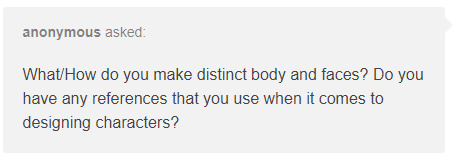
All right, there are quite a few things that come to mind with a question as broad as this, so here’s my best attempt to sum up what character design means to me in like 5 minutes :,D. I’m going to start with a few very quick sketches that talk about more my general approach to drawing, but I’m going to build up to how it all connects with character.
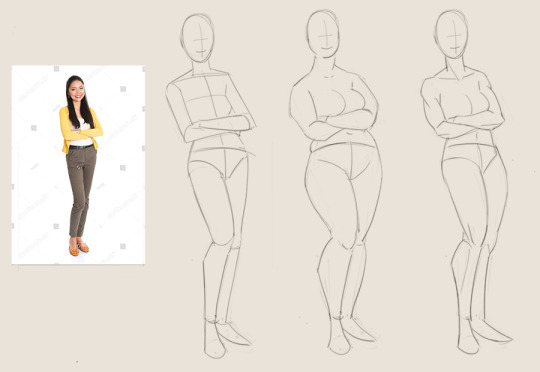
Step 1) Find reference! Whenever you can, use reference, it will always make your character’s posing look 100 times more genuine than anything you can pull from your brain, and that’s nothing to feel bad about. It’s not cheating because we’re not stopping at Step 2 either, which is where the misnomer comes in that you’re just ‘copying’ (protip: even step 2 isn’t a straight Copy; as long as you’re not tracing, you’re not copying, and even tracing has its uses for personal studies). I could do a whole answer of it’s own about picking your reference, but I’ll keep it short by saying: not every reference will fit every character. Keep in mind your character’s attitude when choosing your ref. Some poses are so generic they’re one size fits all, but even this very simple pose has unique character to it. The way the legs are posed, to me, gives it a young and girlish feeling, and depending how you played with the expression, you could even make it come off shy. An overbearingly confident character, while also taking an arms crossed pose, will likely position their legs differently, assuming a stance that takes up more space, etc.
Step 2) Draw pretty much exactly what you see first, but keep it simple. Think of the body like individual shapes; anatomy is not the focus right now, and you’ll actually hinder yourself if you hone in on that first. What you want to do at this stage is capture what the pose is generally doing; character isn’t involved yet
Step 3) Now, working off 2′s framework, start considering body type. If you skip the previous step, you might have a hard time capturing the gesture correctly, since it’s a lot for your brain to juggle at once. When I sketched these two different body types, I built it straight off the first drawing, erasing lines as needed.
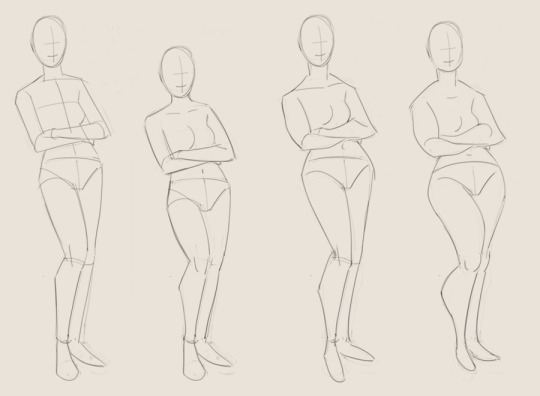
So the first image includes some extremely basic body type variations, this one pushes that idea further. 1 is the basic frame from the last image, while 2 is about playing with proportions. There are a lot of ways you can play with proportions, and as I’ll come to sound like a broken record about: make those decisions thoughtfully. For example, when I made this version shorter than the reference base, I had to consider exactly where I wanted her to lose that height. Here, I made her shorter waisted, took a little length from the legs, and gave her a squatter neck as well. You can do one of these or all of them. Just keep in mind those are all individual options. Letting your train of thought stop at ‘this character is short/tall so I’m just going to generally shrink/stretch their body’ means you’ll run out of variety pretty fast, and sometimes the overall proportions can end up looking wonky (though there’s always exceptions to the rule, remember that the individual body parts should remain correctly scaled in relation to each other).
Image 3 is another approach to proportional manipulation, except rather than focusing on height, it focuses on fat distribution and to a lesser extent bone structure. Again, there’s so many individual places you can focus on here, make sure to mix them up. Arm size, shoulder broadness, chest and hip size, leg thickness and musculature, foot and hand size and so forth.
Image 4 is a further exaggeration of image 3 and the lines have started to get a little more stylized. While image 3 is still reasonably realistic, 4 is just starting to cross into cartoon territory. Advantage of 4 is that when you are able to push the proportions further due to the leniency of style, you can sell a clearer idea and a clearer character. Downside is, well, it looks more cartoonish now, and depending on the needs of your image that might not be what you want ie: it can look like a mistake rather than a purposeful choice if everyone else around the character is drawn more realistically.
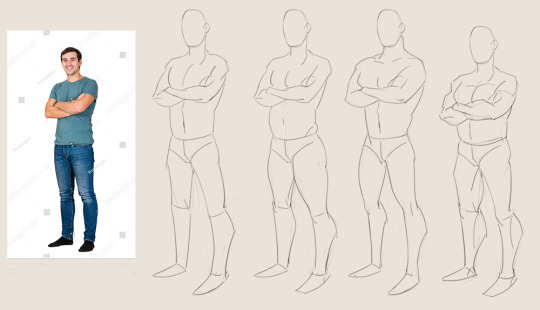
Also… I see variations on this general advice quite a lot for women, but don’t forget about doing the same for men. It’s great to see how eager a lot of artists are to experiment with the female form that is simply absent in a lot of mainstream media, but I find that men really tend to fall by the wayside here even though they often get equally shallow treatment in the mainstream. There’s usually like 2-3 ‘go-to’ body types for men and that’s it. Men’s bodies can have the exact same amount of variety as a woman’s, including the individual ways the fat can be distributed on it, and the assorted ways their proportions can be played with. Whenever I find an artist that does this it’s like striking gold to me tbh.
So there’s some very rough hows. But, perhaps even more importantly than any of that, is WHY you make these choices. This is going to get a little stream of consciousness, but with a question this broad, I tried to hit on as many general points I could think of in regard to my own process.
-When I start to design a character, I really need to have an understanding of them first. This includes things like backstory, personality, habits, so and so forth… Yes, all of this stuff shows up in their design, even if it’s just a drawing of them standing straight up. This isn’t just like ‘this character got this scar at age 7 so I need to know where it goes′, I mean in depth info about them. I touched on this a little bit earlier, bringing up the different ways a character would assume the same general pose, but let me expand on that.
-What do I mean by personality? So there’s the most obvious answer, which is that a bubbly character will assume bubbly poses, a sullen character will slouch more, etc… But let’s take it further than that. This is a concept I’ve touched on in past tutorials, but here’s a quick recap. A character’s personality involves their opinions, for one; how do you make that show up in their design? Well, one of the most obvious questions I always ask myself is: what is their opinion on their own appearance (the thing we are drawing)/how do they want to be perceived by others? Consider a strong character. I see a lot of artists who take this thought as far as: okay, this character is strong, so I’m gonna throw a 6 pack on him, maybe a nice pair of guns, and call it a day. Which leads to like, nice art, but also...kind of bland? I think that’s because this is a rather half-baked approach. How can we take it further? Ask yourself more specific questions. Is your strong character concerned with being perceived as an ‘ideal’ sort of fit by others (the type you give that showy 6 pack to) or does that not matter to them? (more likely to look ‘chubby’ if not outright fat, though probably is just as if not more capable of actually doing some real heavy lifting than saran wrapped abs man). If they’re some kind of mystical being that can look like whatever they want (ie: the anime waif that can also lift 1000 lbs-trope), you should still take into account their personal perspective on appearance. Don’t just stop at ‘this guy/girl is strong so they’ll look super shredded’ or ‘they’re magic so I’ll do whatever’. Doing this, you’ve instantly lost a chance to inform the audience more about the individual there beyond ‘they’re strong’
-Break it down further with their habits. What is their daily life like? If they’re running ten miles every day they should probably have some strong looking legs. If their job involves a lot of lifting, maybe focus on the upper body more and leave the legs less defined. Do they eat a lot? Or drink? The way the fat distributes in both these cases will be noticeably different (and this isn’t even taking into account points like an endomorph vs an ectomorphs body, which I always suggest reading up on). I’d definitely recommend drawing as many different body types as you can just as studies, in order to add these variations to your mental library. I’m sure every artist has seen this popular athlete line up by now, but really study images like this. Don’t just mindlessly copy what you see when you create your own characters though; think about why those athletes have the bodies they have, what they specifically did to get them like that, and how that can apply to your character’s own life.
-One thing that has always bothered me is how often artists are afraid to use the head (not the features; I’ll get to that in a second) as an extension of the body when it comes to imbuing it with variety and character. While it is absolutely possible to have a thin face and a fat body (as is any combo), it’s another missed opportunity not to experiment with chubby cheeks, a soft jawline, etc. It’s a cliche to mention him at this point as an inspiration, but one of my very favorite things about Mucha’s art was how he was able to make fuller faces look so beautiful despite being a rather nontraditional approach (so many art books try to tell you this is a big NO). example, example. These faces actually look like real individuals to me than a drawing that focuses too hard on being generically aesthetically pleasing.
-So, facial features. A face with less traditional features isn’t just going to be more memorable than Stock Beautiful Face #73, but it’s basically a more zoomed in version of informing the audience about the character in the same way the body does.
-Know tropes, play with tropes, do not rely on tropes. Sunken bone structure, long features-guy will always pretty much read like a villain (or at least someone off-putting), but find somewhere to make the formula your own. Give him thicker eyebrows or big ears. Give the girl with the standard doll-face a nose that sticks out a little more prominently or a crooked smile.
-Speaking of are so many different ways to draw a smile, do not underestimate the mileage you can get out of this one feature alone. Artists tend to have a favorite way to draw smiles, in my experience, but remember your character. Would they have a big toothy grin, a handsome ‘cool’ looking smile, a small shy lopsided one, ones that touch the eyes, ones that don’t… This is probably a repetitive point by now but just do whatever you can not to draw the exact same feature on two different characters, and make sure to think through your reasoning for every choice you make. To me, it’s always immediately evident if an artist really knows their character or if they’re just trying to make something aesthetically pleasing. The former is always more attention grabbing in my opinion.
-One of my favorite things to consider when designing a character who’s part of a family: genetics and how you can play with them to inform the audience more about the character’s story. Does this character take after their mother or father? How? Why? Why why, you might ask? This isn’t a photo of a real person, this is an illustration that you should be making deliberate choices about every step along the way. It’s one thing to draw a character that looks like their parent simply because logic dictates they should, another to make meaningful decisions as to where and why they do. Some examples: He has his father’s eyes because they carry the same intensity and other characters are a little put off by him because it (conversely, maybe he’s such a gentle character that this detail stands out twice as strongly). He has the same hair as his father, but he styles it differently to avoid the association. She has her mother’s nose which everyone compliments her on so shes happy to be seen in profile. She has her father’s broad shoulders and she’s a little self conscious about it so she tends to wear baggier clothing. Etc etc! In all these cases, you can communicate these details through even a simple drawing of the character standing alone, and should try to as often as you can.
-In the end, the only way you’re going to know how to draw all these different details, whether they be different body types or different facial features, is by studying real people. Draw as many different kinds as you can, add them to your mental library. Your reference will never give you everything you need to work it, and I’m not sure if that’s maybe what this question as getting at-- if I have a reference folder of go-to ‘types’ or something. I don’t. I have a folder of poses labeled with characters I think they’d fit, and that’s about it. If you’re just imitating what you see in a photo, you’ll always be drawing That Person, not Your Character. So you are going to have to pull some of it out of your brain. Note, however, the important difference between just ‘making it up’ and recalling information you’ve studied in the past.
That said, while on this last topic of expanding your mental library, that includes not just doing studies, but also learning and observing the ways other accomplished artists work. Here are some of my book recommendations when it comes to those which have most helped me in regard to this particular subject. This includes books that specifically tell you how to vary your body types, but also ones that just have a lot of examples of different kinds:
Morpho: Anatomy for Artists
Morpho: Fat and Skin Folds
Famous Artists School Course in Illustration and Design (If anyone is interested in this one and has trouble finding a non $500 copy, hit me up and I’ll help you out)
Spirit of the Pose
Anatomy Lessons from the Great Masters
Drawing People: How to Portray the Clothed Figure
Figures from Life (my favorite currently; not the most varied array of figures but he goes in depth on how to successfully grow an academic study of a model into an illustration influenced by your own ideas and personal style)
If you found this answer helpful, although it isn’t specifically about character design, I go a little more in depth about some of the topics I briefly covered here (such as choosing the right reference, good vs bad reference in general, honing in on shapes, pushing the pose, etc) in this short book of mine :>
#tumblr messed up the coding on the original ask so I had to repost this!#art tutorial#hope this helps!!#not sure if got a little too rambly#i wonder if it's hashtag justintpthings to spend 3/4ths of a post talking about how to draw by talking about thinking lol
115 notes
·
View notes
Text
5/7 Ruins: Legend of the Cursed Royal Palace
1 2 3 4a 4b x 6 7
we like Vector. we’re not going to try to convince anyone that hes, like, a good person. Because he isn’t. But we do think he is a good character. Also we got the blog deleted while prepping this section so vector is cursed and we hate him
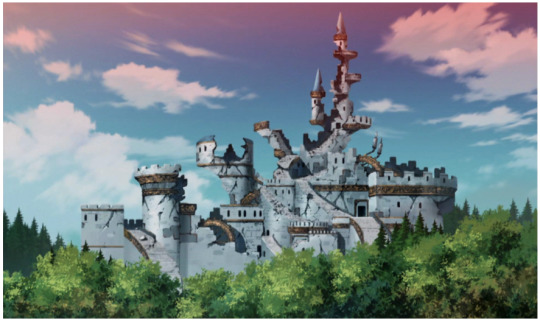
Vector is a spectacle. But he’s is a bit of an awkward character, at least for an Emperor. Unlike the rest of the Barian Emperors, who are morally gray at worst, Vector is pure evil for the sake of it. And generally, villains who are evil for no reason are considered weaker among the cast of villains. Yet he shines through in how yikes he is, and he does have one valid(ish) reason for his appalling behavior.
Vector’s story is one of the most fun out of the Emperors due to how unhinged he is. He is the only Emperor with a near-complete tale. But his story also mixes deeply into Nasch and Merag’s Legend, which creates some problems in how to organize this thing.
To begin, let’s go to his ruins.
Vector’s ruins are located in a dilapidated castle on his island.

Personally, I have nothing to say about this location since this post already did an in-depth analysis on it.
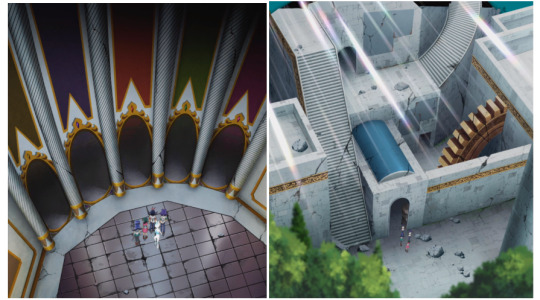
The advanced machinery and layout is interesting. It reminds of the Winchester Mystery House, but that's about it.
Vector’s story is divided into two categories. First is the story of the Legend of the Cursed Palace. This consists of only the text provided within the palace. The second is all the additional information we obtain through Vector’s memories, Nasch’s memories, and Abyss’ intervention. Because of this, Vector’s past is the most vast out of all the Emperors. But is is also the most confusing due to conflicting information.
The Legend of the Cursed Royal Palace is told to us by Rio, and it is rather simple.
Long ago, there lived a cruel prince in a palace. The prince was so cruel that everyone died. The end. Vector was a childish king who lacked faith in humanity. He executed anyone he doubted by beheading them as he watched. According to the legend, when he was “the last one standing” he took his own life by stabbing himself with his sword.
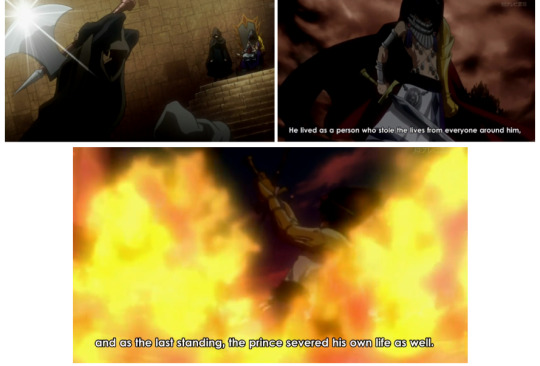
That’s all the information from the ruins. This legend gets complicated with the rest of the story, so I’m gonna recount it as briefly as possible without any additional analysis.
Starting all the way at the beginning, Vector was born as this little uggo peanut right here, and he was the herald of peace.

He came from two persons that are complete opposites of each other. One is a kindly mother who desires peace and the other is a ruthless warlord who wants war.
While sleeping in his crib, the Mythyrian Card “Number 65: Split-Decision Djinn - Judge Buster” fell onto him from the sky. Vector absorbed the Number into his body.

Years later, Vector’s father fell ill. Vector took over the kingdom, and he promised his mother and his citizens that he will bring peace to their kingdom. He did this by signing a peace treaty with the nations his father was warring against.
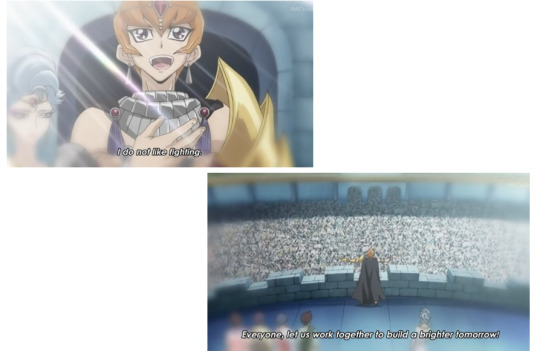
Angered by this, his father pulled out his sword and attempted to kill Vector with it. His mother shielded Vector with her body to protect him, resulting in her death. His father then collapsed from his illness and died on the spot.
Vector mourned for a brief moment before Don Thousand approached him. Don Thousand embedded the Over-Hundred Monster “Number 104: Masquerade Magician - Shining” in him to make him believe he killed his parents, thus saying the lovely line “You shall not be the prince of tragedy, but a prince of madness” and Vector followed suit, becoming cruel and sadistic.
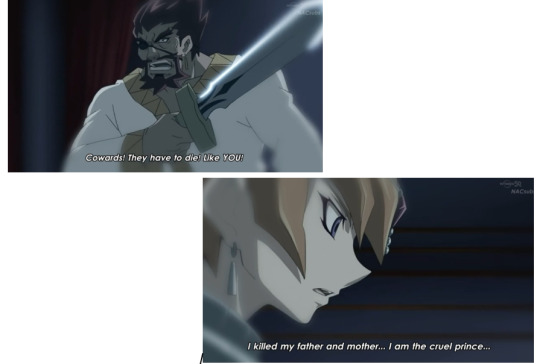
An unspecified amount of time passed before Vector ran into Nasch, Merag, and Durbe.
Vector attacked Nasch’s kingdom with his fleet of ships and “Gorgonic Guardians”, which are Medusa-like monsters. Nasch counterattacks by using mirrors on them. As he was close to losing the battle, Vector performed a blood sacrifice to summon a god, which also happened to be Nasch’s Mythyrian Number “Number 73: Abyss Splash, the Roaring Waterfall Deity”. In order to purify Abyss, Merag sacrificed herself to summon another god, which is her Mythyrian Number “Number 94: Crystal Zero, the Princess of Polar Ice”.

Nasch gained control of both gods and used them to force Vector to retreat. Vector ran as Nasch and Durbe pursued him, destroying villages and kingdoms as he did so.
Eventually, Vector was cornered in a Labyrinth, where he tricked Nasch into sending his army to their death via a Shadow Game. Regardless, Nasch defeated Vector again.

Vector fled back to his kingdom this time. In a fit of rage, he murdered everyone in his kingdom. Nasch followed him to the palace and found Vector surrounded by the dead bodies of his people.
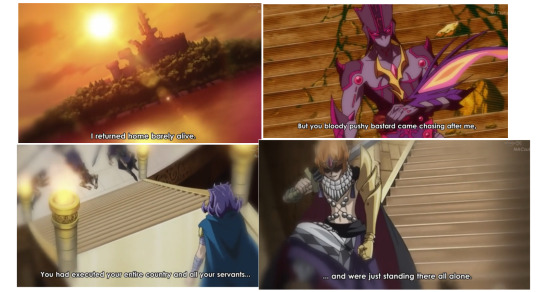
They had a final showdown; Vector lost once more. Upon losing and in Nasch’s words, “... those you murdered... dragged you into Hell”.
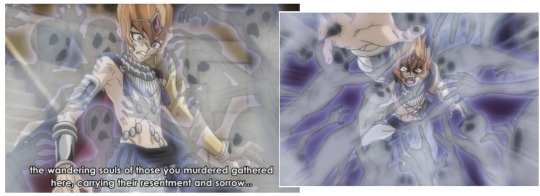
And that’s Vector’s story.
Now, the only thing that is up for debate is how Vector died. The Legend of the Cursed Royal Palace stated that he committed suicide while Nasch’s recount said that the souls of his victims killed him. This may be a plot hole, but in the prior episode, both sides of this story were mentioned. Vector had a nightmare where he was being chased by the restless souls and Astral mentioned that the mad prince took his own life. Vector originally denies Nasch’s recount of his death at first, but quickly the souls manifest (because they were dueling on the field where Vector held his executions) to prove that this scenario did happen. This means that the writers are semi-aware of the situation, but they don’t state which is the true fate.
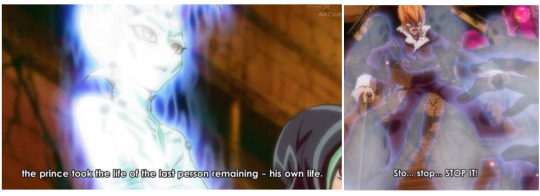
Since it is unknown who scribed the legend onto the ruins, Nasch and Vector’s shared memories + the final scene in the Vector vs. Nasch Duel outweighs what is written in the palace.
If anything, it’s possible that the tormented souls drove Vector to the tipping point of his madness, resulting in Vector taking his own life to escape them. Although, that is just my interpretation.
But from here, we can finally discuss Vector because he is just full of it.
Firstly, I want to talk about genetics. Specifically these lines right here.

I find this extremely fun because there are two things at play here. First is that Zexal specifically states that his cruelty derives from his father—on the other hand, his kindness should derive from his mother—and second is that Don Thousand is able to kick this into overdrive. I doubt that the writers were thinking about any of this when they made this story, but this is a fun observation that I noticed (but if they were, kudos to them).
Forcing some real-life concepts onto yugioh again, let’s talk about heritability. Heritability measures the variation between a trait of a parent (such as hair length, body size, temperament, ect.) and the traits of an offspring within a population of individuals. High heritability means that the phenotypes (physical characteristics) of the parents correlates to the phenotypes of the offspring, and vice-versa with low heritability. In humans, personality is a heritable trait, and in our species, one of the most heritable personalities is neuroticism. High neuroticism attributes to emotional instability and plays into emotions such as jealousy, loneliness, anxiety, anger, ect.

There are four other major personalities, but for this, I’ll focus on neuroticism. Honestly, you could put any trait here since any of them loosely applies to this concept.
Okay. So does this mean that Vector was doomed to a life like his father. His genetics oughta leaned him that way. But NO, no because humans are far more complicated than that, and genetics is not the only thing that affects a person's behavior. But it does influence it some, and this is the basis of it’s influence.
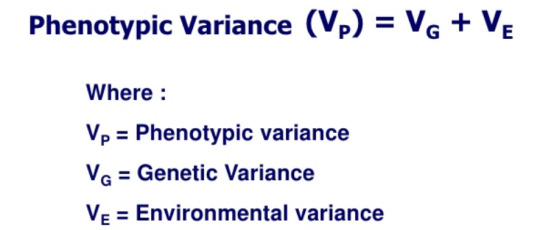
What this says is that within a population, (genetics + environmental influence) = variation of a trait. Some phenotypes are heavily controlled by genetics while others are not. A simple example is if you have tall parents produce an offspring who have the genes for being tall (assume that it is moderately controlled by the environment). If the offspring grew up in a poor environment (less food or something) it will be short relative to the rest of the “tall” population. But if the offspring grew up in a good environment (more food), then it will be tall relative to the rest of the population.
For the five different personalities in humans, each of them varies in how much it is influenced by genetics and how much of it is influenced by the environment (this is stingy since studying the effects of environmental influences on humans is very difficult and hard to replicate). But neuroticism is one that may have significant interactions between genetics and the environment.
But enough science, let’s go back to Vector. Vector is really fun because his situation allows him to exist on all of the spectrums. He went from incredibly kind-hearted and peaceful to just not. This is possibly due to his inherited neuroticism and the environment he was exposed to.
It is likely that the “current” Vector’s neuroticism is rather high. Scoring high in neuroticism means that an individual tends to have low emotional stability, which attributes to frequent mood swings, high irritability, insecurity, and emotional volatility. This trait is more complex than that, but that’s the general gist of it. Most of this could be seen when it comes to how he treats others and how others treat him.
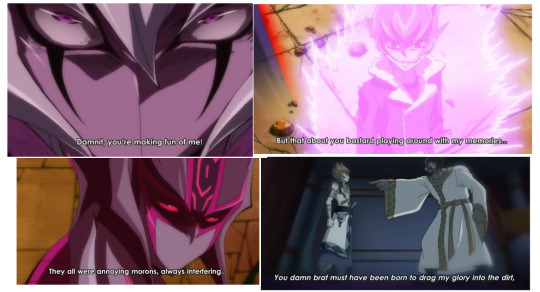
With Vector, he hates it when other people mock him or control him. This is why he despises Nasch for being better than him and why he betrays Don Thousand for toying with him. He is someone who needs to be in full control of the situation; this could be because of his insecurity (like, he got really pissed when Merag gained the upper hand and began to insult him during their duel). Vector is also described as being incredibly untrusting of other individuals, hence why he kills anyone he doubts. These traits are similar to that of his volatile father, whom he also shares a similar vocabulary with when describing people they hate, or anyone against war.

On the other hand, scoring low in neuroticism means that an individual can handle stress very well. Often, they are calm and composed. This could only be seen in Vector prior to Don Thousand’s interference; i.e. when he was handling the kingdom after his father got ill. He also maintained his calm composure while his father scolded him and pulled a sword to kill him.
His mother was kind and his father was not; Vector likely inherited some mix of neuroticism from them. Kindness and evilness was always inside Vector. And this allows him to exist as the kind “Rei Shingetsu” and the cruel “Vector” depending on the environment he was exposed to.
So what were the different environments? I think it was the Mythyrian and Over-Hundred Numbers.
Genetics played a role in shaping the core of Vector (“the same cruel blood as the king is running through you” and all) but it was the environmental influences added onto his core. Here’s a simple graphic.
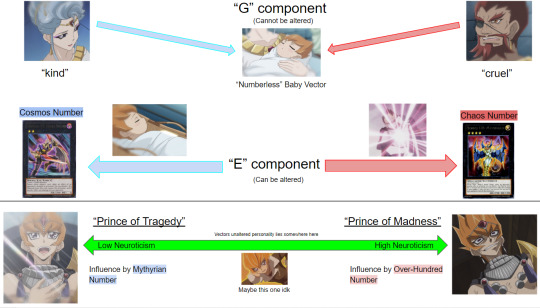
Vector is a baby who inherited his father and mother’s neuroticism (perhaps he has an intermediate; I do not know the mode of inheritance of this). The Mythyrian Number card pushed him hard into the low neuroticism section. The Over-Hundred Number pushed him into the high neuroticism section, and this was where he stayed until his death by Don Thousand.
What I’m getting is that the “gentle prince” persona is not the actual Vector, but a Vector under the influence of a Number Monster (albeit a kind one). You could say the same with the “Prince of Madness” Vector, that he is also a false Vector influenced by an evil Number Monster, but there’s some glaring evidence that this evil Vector is closer to the actual Vector than the kind one. I’ll get to this later when I talk about his Guardian.
It’s highly possible that a “Vector” untouched by the Numbers would have existed somewhere in the middle since his mother and father would be the environmental influences in that case (or maybe they would’ve pushed him to one side too). The closest we get may be the one at the very end of the show, where Vector is “not evil” but still a trickster, mischievous type of guy.
Overall, Vector is a character who had great potential for kindness, as stated by Don Thousand, but he also had the greatest potential for darkness as well. Don Thousand took advantage of this and gave Vector the environmental influence he needed to become the cruel, lovable character we know today.

I just think it’s neat that Vector has a plausible reason why he went from baby to killer.
Alrighty. So about those dang Number cards.
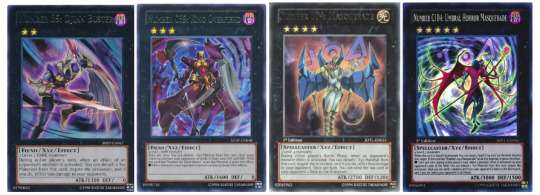
Both of these cards and their respective Chaos upgrades represent the two sides of Vector. “Number 65: Split-Decision Djinn - Judge Buster” to “Chaos Number 65: Split-Decision Demon King - Judge Devil” and “Number 104: Masquerade Magician - Shining” to “Chaos Number 104: Masquerade Magician - Umbral”. There is one specific play with these two that makes me enjoy Vector so much.
But before I get to that, I need to talk about the influence of each monster on Vector and his Guardian.
As stated previously, these monsters altered Vector’s personality. “Masquerade Magician” is the more obvious of the monsters. It’s a masquerade; it hides under a mask and fools people. That’s just a normal Vector. A neat factoid is that the “Shining” to “Umbral” at the end of “Masquerade Magician” is related to the reveal of Shingetsu to Vector. Shining obviously means light (hence the light-attribute) while umbral means shadow (hence the dark-attribute). Number 104 and its Number c104 were first played when Vector revealed himself to Yuma during the Sargasso Arc. Light to Shadow, Shingetsu to Vector.
“Judge Buster” is more difficult due to its relationship as a Mythyrian Number. It is a monster who altered Vector to be as good as he can be. It is supposed to be a fair and truthful judge, the polar opposite of “Masquerade Magician”.
But this is where things get very complicated. Despite being Vector’s “good” card, it is no different than the Over-Hundred that infected him. From the perspective of his father:

Vector is a “cursed” child because he lacked any of the ruthless characteristics of his father. The way the Numbers “65” flashed on the screen is also similar to when other characters use or get possessed by a Number Monster. Vector was cursed, or possessed, to be a kind and gentle prince. In this case, despite being a very positive force on Vector’s life, the curse of a Number is still a curse. Eventually Vector loses his initial curse to inherit Don Thousand’s curse.
But the story of “Judge Buster” doesn’t end there. It continues into the story of Vector’s Guardian and it’s ascent into a Chaos Monster.
The Guardian of the Cursed Royal Palace is a very interesting one. Vector is unique because his Guardian is completely unrelated to his Mythyrian Number, unlike Jinlon and Abyss for example. Vector’s Guardian does not speak and can only be described as a feral, bloodthirsty beast.
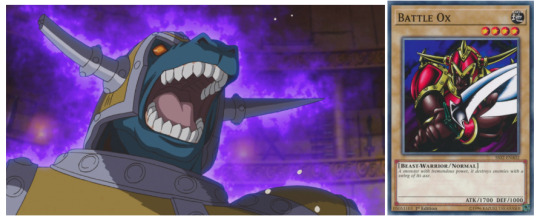
This guy is based off of another card called “Minotaurus” or (“Battle Ox” in the TCG). Despite not being related to the Mythyrian Number like the other Guardians, Minotaurus is completely related to Vector’s story. It’s flavor states “A cattle monster with tremendous power. It mows down anything with a single axe swing.”
Now, there are several things to note here. An obvious one is that the Guardian is a Minotaur. In real life, the Minotaur derives from Greek Mythology. It is a beast that commonly resides in Labyrinths waiting for sacrificial maidens. With this detail, there is a direct connection to Vector’s story in two ways.

First is that Vector describes his palace as a “Labyrinth of Screams” and second is that he lured Nasch into a Labyrinth to kill him. Two very prominent settings in the Vector’s story.
Minotaurus is a deliberate choice made by the writers to tie this theme together, but this is just a neat easter egg. It is the actions of Minotaurus is what counts.
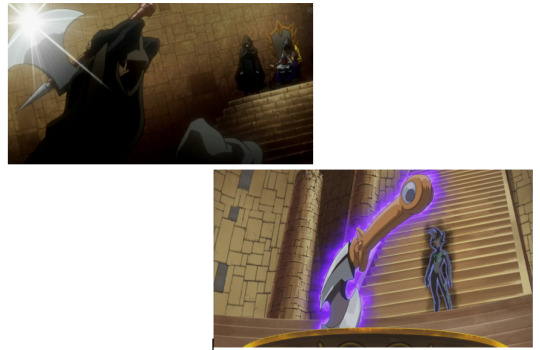
The other thing is that Minotaurus’ weapon of choice, its axe, is located on the execution slab where Vector beheads his enemies.

Finally, and the one that I think is the most interesting and peculiar, is that the axe has Vector’s Mythyrian Number embedded in it.
This is highly significant because if we look at all the other low-grade Emperors, their Mythyrian Numbers were abandoned when Don Thousand infected them (and they died shortly afterwards while Vector lived a part of his life with his Over-Hundred inside of him). In the end, most of the Mythyrian Numbers we see are held on a pedestal, or given some type of reverence in the afterlife.
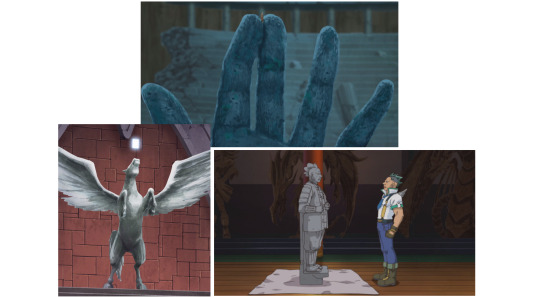
Vector’s card has an axe going through it, like he was trying to get rid of it.
There’s a lot of assumptions to be made here with the most basic argument being that this detail bears no significance to Vector. BUT my theory is that the spirit of the card manifested to him at some point after he became a ruthless warrior. “Judge Buster” may have been trying to help him, or it was trying to convince him that the Over-Hundred infected his mind. Since Vector is a character filled with doubt and trust-issues, he likely ordered his executioner (Minotaurus or someone else) to behead “Judge Buster”.
(Also, Vector said he noticed that Don Thousand altered his memories “a long time ago”? It was never stated how Vector found out. I think that he may have gotten this critical information when “Judge Buster” manifested in his past life. Perhaps it told him everything that happened. This means that Vector known the truth about his fate since his past life, and given his slick shrewdness and foresight, perhaps)
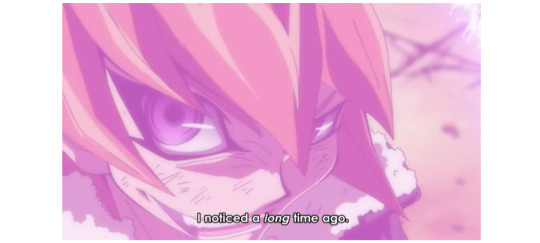
So you know when I said that “evil” Vector is probably closer to the “true” Vector than the kind one? It’s due to his relationship with his Mythyrian Number. From this possible encounter in their past life, the end result is that Vector actively rejected the Mythyrian Number’s blessing to accept his cruel heritage, which is thoroughly reinforced in this scene.

In his duel against Nasch, Vector used “XYZ Discharge” to give Nasch all of his monsters to feint surrender after he found out about his true past. Vector immediately turned around and used “Trick Buster” to blow them up and kill Nasch while his guard was down. This move tells us everything we need to know about Vector. Vector knows of his two lives as a “good” and “terrible” person, and he chose to actively ignore them. The card “Trick Buster” could be seen as a combination of his two curses and what Vector got out of it. “Trick” comes from the trickster nature of “Masquerade Magician” and “Buster” comes from “Judge Buster”. Like with his past encounter with “Judge Buster” (which should’ve been able to repel the curse of the Over-Hundred) Vector rejected and executed his Mythyrian Number as he did with this new, possible redemption.
He made that choice. He made both of these choices on his own free will. This is a major reason why Vector is described as “evil for evil’s sake”. When given a chance at redemption after he “found out” about his true past, instead of rejecting the life that Don Thousand gave him, Vector staight up said he doesnt give a fuck if he was supposed to be a good person. It’s kind of incredible and I think that’s just,,, wow i love him.
And to add onto this fact, we need to talk about the Mythyrian Chaos Numbers, which is an oxymoron in the Zexal universe. “Judge Buster” and “Abyss Splash” (Vector and Nasch’s Mythyrians respectively) are the only Mythyrians who become Chaos monsters as well as being the only Emperors who use their own Mythyrian Numbers (Gilag doesn’t count due to raccoon-related shenanigans). This holds some discussion between these two, but I can’t really talk about it until I talk about Nasch.
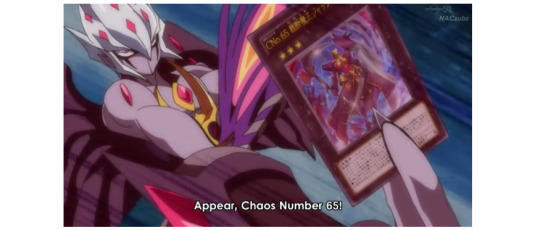
However, what I want to say is that Vector chooses to use his Mythyrian Number. Although he randomly summoned it with a card effect, Vector plays his Mythyrian Number. Likewise in my discussion with Alito’s ruins, the Mythyrian Numbers have a purifying effect on the Emperors. It reveals their true, unaltered personalities. By choosing to use a Mythyrian and subsequently revealing his true nature, the cruel person we see is just how Vector is. His usage of “Trick Buster” backs this up. I don’t think it's a coincidence that Vector and Nasch, arguably the strongest of the Emperors, are also the ones who accept their Mythyrian Numbers yet still end up in Barian World. They are also the only ones that were able to Chaosify their Mythyrians, with Nasch performing a proper Chaos summon while Vector pulled into “Chaos Number 65: Split-Decision Demon King - Judge Devil” by luck.
Because of his denial of the Mythyrian Number despite being aware of its existence, Vector is the only Emperor that isn’t described as heroic in his legend. By being an active participant in his descent into Barian World, Vector cannot have a heroic legend like the others. He is simply a vile person who likely deserved his spot in Barian World.
Now that we got that down, why did Vector end up in Barian World despite being his “true personality”? A simple answer is that Barian World represents Hell, and Vector deserved to go there. However, it’s repeatedly stated in the show that Chaotic persons end up in Barian World, not bad persons.
And Chaos is complex due to the range of characters it goes through.

Like, this is a massive list of personalities, and they are all canon Chaos creatures.
And if you haven't noticed, I haven’t discussed the Cursed Royal Palace’s duel yet. This is because it occurred between Black Mist and Astral, and it has little relevance to Vector himself. However, that battle ties into the complexities of Chaos that I will continue with Nasch and Merag’s Legend, as well as the rest of Vector’s story.
Bye.
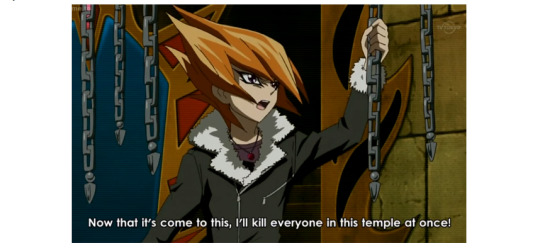
#long post#tw long post#zexal#vector#barian biology#dyzarc diet#dyzarc writes#sory for the length#blog shouldve stayed deleted#this one went on a weird tangent
64 notes
·
View notes
Text
Linguistics Jobs: Interview with a Product Manager
A lot of tech people I know say “the best skill a programmer can have is knowing how to look up the right answer on Stack Exchange” It’s one of those websites that people use every day, but perhaps without thinking about how it gets built. Megan Risdal is one of the people who make Stack Overflow happen, as a Product Manager leading Public Q&A. As Megan mentions below, there’s even a Linguistics Stack Exchange (you might just see some old answers from me there). Megan has not only forged a career for herself in tech, she helps demystify the industry for other linguists who might follow in her footsteps, on Twitter (@MeganRisdal) and her blog.

What did you study at university?
My undergraduate degree is in Psychology from the University of Wisconsin, Eau Claire where my interests were in individual differences. I also did a minor in French and this is where I first learned about linguistics as a field of study. My combined interests in language and individual differences psychology led me to completing a senior thesis project on variation in attitudes towards linguistic diversity. Just last year this work was published with my then advisor, Dr. Erica Benson, as a chapter in Language Regard: Methods, Variation, and Change.
From here, I did a Master's degree in Sociolinguistics at North Carolina State University. Building on my statistics background from studying psychology, I dove deeper into quantitative methods, learning R along the way, while focusing on sociophonetics and laboratory phonology. For my capstone project, I measured articulatory (ultrasound tongue imaging), aerodynamic, (nasal/oral airflow), and acoustic variation in coarticulatory vowel nasalization strategies among Anglo-American and African American (Vernacular) English speakers.
Finally, I started a PhD at UCLA where I intended to continue studying laboratory phonology. I only ended up finishing one year which was spent on theoretical foundations, articulatory phonetics, and learnability before leaving with a second Master's degree in Linguistics. I ended up deciding to leave academia because I was disillusioned already with the prospect of the job market and the limited potential for my work to have impact beyond academia. I made my mind up when I applied for a job at Google and got an interview. I ultimately failed, but this was enough for me to feel confident my resume was "good enough" (completely incidentally I ended up later getting hired and working at Google for a couple of years prior to my current role).
What is your job?
For the past six months I've been working as a Product Manager at Stack Overflow where I lead the team working on public Q&A. If you're not familiar with Stack Overflow, it's a site where anyone who codes can come to find answers to their programming questions. We also have the Stack Exchange network which has similar Q&A sites for other topics like cooking and anime. There's even a Linguistics Stack Exchange site.
In my day-to-day, as a product manager, I work closely with our developers, designers, researchers, data scientists, community managers, marketing, and leadership. So, it's a lot of meetings and a lot of Google Docs. My job entails taking many, many inputs and synthesizing them into a strategy and product roadmap that the team executes on to make Stack Overflow a more useful, engaging place for all developers. On a given day, you could catch me writing a new feature specification for a developer, reviewing results of an experiment with our data scientists, or dropping in on user interviews. One of the things I love the most about my job is the variety. If a project is slipping or we just don't have the resources for something important, I'm the person who can step in and do what it takes to make sure the work of my collaborators adds up to something successful.
How does your linguistics training help you in your job?
My training in linguistics absolutely helps me.
First, and most importantly I believe, my background in sociolinguistics has taught me the significance of diversity among groups of people (like users of a product) in so many ways. For example, Stack Overflow sees many millions of users every month, but we know that not everyone is equally likely to participate on the site. There are huge, intimidating barriers to participation which disproportionately impact different groups of people depending on things like their background and experience coding. So every day I think about how changes to the product will affect different types of users. Me and my team are constantly striving to better understand the important ways our users vary in their backgrounds, motivations, and pain points and how we can better meet their needs. Especially in a globally diverse online community like ours where users interact and community with each other it's extremely important for me and my colleagues to think about always.
Second, and more concretely, the quantitative methods and experimental best practices I acquired while studying linguistics are highly applicable to my day-to-day job. We make use of a lot of different qualitative and quantitative research methods at Stack Overflow and having training in this area allows me to leverage these resources effectively in my product decision-making. Before I joined Stack Overflow, I had also spent some time as a data scientist, so my background in statistics and R was extremely relevant there. Without this training, I don't think I would be where I am today.
Do you have any advice do you wish someone had given to you about linguistics/careers/university?
Overall, I'm very happy with my trajectory. I'm extremely grateful to everyone who supported me at every stage and I would not be where I am today without all of these experience (yes including dropping out of a PhD!). That said, some thing that I wish I had encountered sooner are:
Seriously, build a public portfolio. Make your work visible. Curate an online presence. Having even a just a modest Twitter following and some publicly discoverable content with my name on it has helped me immeasurably in my career. Oh, and learn git.
Pay some attention to what's going on outside of your academic bubble. I fully intended to stay in academia when I started my PhD at UCLA. Had I thought somewhat ahead of time about the possibility that I would end up industry, I may have prioritized different classes or perhaps even chosen a different PhD program altogether. For example, if you have a choice between learning OCaml and Python, maybe see what non-academia has to say, too, as an input to your decision. Then again, hindsight is 2020. I would have seriously regretted not taking statistics/research methods under any circumstances, though.
Any other thoughts or comments?
I think every tech company should look to hire people trained in linguistics. There are so, so many ways in which a background in linguistics is relevant to so many careers in tech. From user research to data science to (apparently) product management, a background in linguistics adds a unique and valuable perspective. If you're not sure what you're qualified for, carefully tailor your experience, cast your net wide, and seek out advice!
More from Megan
Twitter @MeganRisdal
LinkedIn
Personal blog
Recently:
Interview with a Communications Specialist
Interview with a Learning Scientist
Interview with a Lexicographer
Interview with a Journalist
Interview with a PR Consultant
Check out the Linguist Jobs Master List and the Linguist Jobs tag for even more interviews
#language#linguistics#lingjobs#linguistics jobs#linguist jobs#careers#job#work#employment#graduating
125 notes
·
View notes
Text
No Time-Space, Only Mind-Space
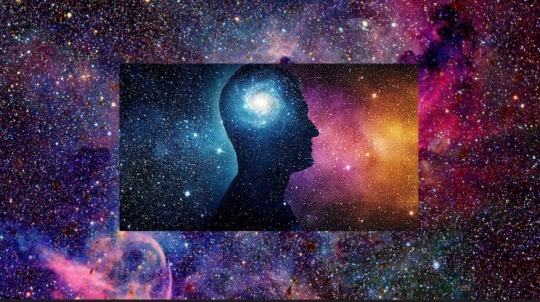
So recently, some of you may have noticed, that I’ve started to use a certain phrase; a strange new bit of terminology, that I’ve employed more then a couple of times in the past few videos. And this neologistic nomenclature seems to have piqued a little interest among you; leaving those within you wondering, what could this peculiar designation mean exactly? And this uncertainty has undoubtedly left many of you feeling anxious and watchful. Well, have no fear, the Meta Sage is here. The term in question is: “mind-space.” What is a “mind-space”, exactly? And to what, does “mind space”, apply?
The first outside inquest concerning this matter came about a week or so ago, when a commenter by the name of “The Trickster”, mentioned it specifically. Thereafter, the subsequent comment exchange that followed, served as the inspiration for this current video. But, before we delve right into the thick of the matter, I’ll read the transcript of that comment exchange, as it happened; to both, act as a supplementation to this video, and to hopefully, delineate for you, the basic premise of the subject at hand.
So, here’s the transcript:
The Trickster: You are hanging on to an unfalsifiable narrative that reality is just, as you called it, a "mind-space”, and anyone with differing ideas are lost in their own externalizations, or something. Did I get that right?
Meta Sage: More or less. Nice implication, but the “mind-space” is undeniable because it’s already the case before anyone can think about it. It’s the “space-time” theory that’s a conceptualization, and needs all kinds of explanations and narrative to support it.
The Trickster: Ergo, the mind-space theory is ultimately an unfalsifiable concept you choose to believe. As it can't be properly substantiated or debunked. See, I like you, Meta Sage. I don't dislike the ideas you put forth. But only a sheep refuses to question a particular narrative. And I also like poking holes in a narrative. “Space-time”, on the other hand, can be tested, debated, analyzed without an absolute perception.
Meta Sage: You have the whole thing mixed up, which I noticed last week when we were talking in the comments on the other video. You glossed over what I just said and reaffirmed a falsehood. To move forward, you have to break free from this obstacle; and you can do this more easily by throwing out the old model of reality. Case in point: If we take two people, wipe their minds clean of all memory, then put them together in a room to discuss reality, the “mind-space” is already the foundation of everything, before even one word can be spoken. The context of existence is undeniable, and this is a reality before any debates, tests or analyzations take place. The “space-time”, on the other hand, cannot even be discussed without first learning a whole bunch of things that one then has to assume as reality. There’s a slight difference. You have to be able to discern between reality and abstractions.
The Trickster: Yeah. I won't write a long response. Rather, I'll ask this, why do you assume the idea of a “mind-space” is inherently present in the minds of said individuals you mentioned in your example? If you propose life is a dream, most without some sort of philosophical capacity would just miss the meaning of such an idea. While time itself is experienced by everyone regardless if its an illusory and misunderstood aspect of reality. Most know time is the measurement of events in existence. A mental construct? Yeah. To some extent. But the “mind-space” idea is an abstraction by its very nature. An unfalsifiable idea which only needs one to believe, and no argument posed to it can truly debunk or pick it apart. Just because the mind serves as a useful interface for interacting with and perceiving the world it doesn't automatically mean the mind creates reality. Yes, we are experiencing something. But let's not jump to conclusions. But look, I won't claim to know everything. If I've got things mixed up feel free to correct me.
Meta Sage: Thanks for keeping that so short. Thing is, I don't have to assume an idea of awareness. Awareness is already the foundation. Or, said another way, because there is awareness, abstract aspects like "ideas, concepts and theories", about a so-called "existence", can be formulated. Now keep in mind, when I speak of awareness, I'm not trying to assign it an identity. It's not a consideration of a "me" or "them", when it comes to awareness. There's no "people" existing to experience something, nor any "world", and it certainly isn't a human's mind that is creating anything. Identities are part of the dream. None of this phenomena is your true identity. So the idea is to be able to discern between awareness, abstractions, and dream phenomena. Conflating these aspects is where the confusion arises. It's the context within the field of dream phenomena, that I call the “mind-space”, and this is to clarify the fact that it isn't a physical location. "Physical locations" are ideas formulated about a purely mental phenomena. As is "time" also. These are all just ideas about illusion. Only awareness is reality.
So, that was the exchange. And so now, I’d like to expand a bit more on the subject, and really try to make things nice and sparkling clear. In a sense, this particular teaching could be considered one of the core foundational principles of Pure Potentialism. If one can manage to grasp this essential teaching, much of everything else will fall into place a lot more easily. Simply put, one of the core principles of Pure Potentialism is that the context of experiential reality is the mind, not physical locality. This is what is meant by “mind-space.” The apparent “space” that things seem to occupy, is made out of pure mind, not made out of objective materiality.
Sounds easy enough, but it’s actually rather difficult to realize; as the idea of materiality is ingrained deeply into people’s minds unconsciously, so maintaining crystal clear clarity will be a very strenuous mental effort to undertake; and, to top that off, people don’t find any ego gratification in this, thus, are generally dissatisfied with the cold stark truth, and, ultimately, will deeply yearn to find some other kind of narrative; one that provides an explanation that places a great deal more importance on their ego’s supposed existence. That’s what matters most to the average man. His precious self image. His dandy pride. His lofty self importance. It’s really quite rather disgusting actually. So it’s an uphill battle the entire way. Thus, the way to start to make some tracks towards clarity, is found in the lucid discernment between awareness, abstractions and dream phenomena.
This is the stumbling block that The Trickster got snagged on. He got SNAGGED on it. The Trickster can’t tell the difference between awareness, dream phenomena and abstractions. He wrongly conflates them, then argues his points premised on this falsehood. So, I’d like to break this right down for you, which will hopefully lend some much needed cohesion to the matter.
1. Awareness. What is awareness? Awareness is the absolute base, and allows all else to be possible. It’s the original face, and the undermost real true identity, despite having no physical embodiment, or manifest qualities. What will we find to be the case, after every single falsehood is stripped away? After peeling back all the thoughts, the identifications with a self, the objects around you, the entire world; only this, is what remains. Awareness. And so now that there is awareness, there can be some “thing”, to be aware of. Or, “something can be imagined to be the case”, to be more exact. Now that there is awareness, awareness can be aware of imagination. And the imagination isn’t a thing. It isn’t located anywhere. Indeed, the imagination itself could be said to be imaginary. Hence, said another way, awareness can dream. And since awareness can dream, there can now be an aspect called existential reality. This is what awareness does. It imagines existential realities, with varying degrees of fleeting qualities. And this brings us to the next factor: dream phenomena.
2. Dream phenomena. What is dream phenomena? Dream phenomena is an illusion. It’s what the imagination of awareness imagines into being. There are no limits as to the possible variations the illusion can be imagined to take. And the context of any such imagined illusory variation, is what I refer to as the “mind-space.” The “mind-space” are the borders that hold together a particular illusion. Wherein, consciousness can now find it’s ground, and quickly begin to establish identifications that will bring it self affirming fortification. If this consciousness ever manages to become refined, it will perhaps recognize itself in it’s own reflection, and suddenly become self aware. And once self aware, there can now be these aspects called thoughts, ideas, beliefs, concepts, theories, and knowledge. Now a consciousness can philosophize about it’s own supposed “existence”, and make speculations about who, what, when, where, why, and how, this is. Which, brings us to the next factor: abstractions.
3. Abstractions. What are abstractions? Abstractions are the intellectual activity of a consciousness. The constant yammering of the inner voice. The ongoing internal narrative we tell ourselves is the storyline of our supposed existence. The purely intellectual deductions, and hence purely intellectual conclusions, that we THINK; and then go on to call that a reality. This is where things get murky, and then awareness, dream phenomena and abstractions become a muddled amalgamation of confusion; where now, one will have a hard time telling the difference between the concept and the object of reality, and may even mix them up entirely. This is exactly how the truth of the “mind-space” became forgotten, and how we now think we live in this idea of a “time-space” context; and went on even further to suggest that, the one and only true sure thing, the “mind-space”, is just a belief, and that the “time-space” idea, is actually the true default reality. Enter The Trickster.
So now you can see some of the reasons how and why this whole thing became so deeply convoluted. If the only things you think to question are only staged on a foundation of materialism, and inquiry into the intro-spectrum is something that never occurs to you as important, you are a pretty lame example of a skeptic. The Trickster makes the assertion that only a sheep doesn’t question a particular narrative, yet, oddly enough, doesn’t think to question the narrative of his own materialistic belief system. Apparently, he accepts as an unquestionable given that “time-space”, the normative mainstream belief system that has the general consensus of the shepherd’s flock, is a fundamental truth. And that’s truly rich. But, overlooking that for the moment, let’s move on to address one of the central themes of his argument: that the “mind-space”, is unfalsifiable; and cannot be properly substantiated or debunked.
Well, as far as being “substantiated”, is concerned, everything I’ve said thus far should leave no doubt as to why this isn’t that hard to flesh out. It’s only your over-thinking process that makes it extraordinarily over-complicated. Awareness is the fundamental truth. This might be about the only thing one can say to be, “self evident.” Without awareness, you cannot cast doubt, or weigh evidence, in the first place. Without awareness, you cannot even begin to make substantiations. So, if you actually have consciousness, and are not just a mindless zombie, then your consciousness is substantiated just by being conscious. What other evidence would you require that you are conscious, other than being conscious?
And as for debunking; what the hell would you hope to debunk anyway, your own consciousness? That seems a bit counter intuitive; and this is what makes me think that you’re just playing the usual little bullshit games of a delusion whore. Stop it. You have an absolute foundation that establishes a proper setting for investigative inquiry, and you wish to lessen it through doubt, or minimize it to some secondary status behind inanimate matter, for what purpose exactly? Or, as he so eloquently put it, “it’s a useful interface for interacting with the world.” The “world”, he comfortably assumes; but what gives context to his entire existence, he harbors reservations. And by the way, no one ever said that the “mind-space” creates reality, so it’s actually YOU who jumped to those conclusions. As previously stated, awareness dreams of a “mind-space”, and the context within that “mind-space”, is what you are wrongly calling an objective world. The “mind-space” is not a useful tool for interfacing with a world, no. There is no world. The “mind-space” is the composition of reality itself.
And if I need to go over the fallacy of the whole time delusion again, then you probably haven’t been paying attention. I’ve already deconstructed the idea of space, and much the same will apply to the concept of time. Yes, the idea of time is only an abstraction. The patterns you see in nature do not represent time. One rotation of a planet around a star is not indicative of any objective factor operating in the universe. There is no universe. Time is a completely fabricated ‘relative-to-a-subject’ tool, and nothing more. And it doesn’t matter that you can test it, debate it, or analyze it, without an absolute perception, (whatever the hell that’s supposed to mean), it doesn’t change the fact that time itself doesn’t exist independently to the factor that is giving time significance. So assuming the concept of time as some kind of fundamental groundwork of reality is a big problem. There’s no problem, on the other hand, with the truth of the “mind-space” reality. The only problem here, is your over-thinking intellectualism. An over-thinking intellectualism that likes to over-think so much, it now believes it’s ideas are reality, and that the actual reality is an idea. Nice!
And when it comes to “falsification”, that whole idea is largely stupid. Why would you make the criteria for a phenomena to be considered scientifically, a prerequisite of having certain conditions where the phenomena can be shown to be false? Does that seem to be reasonable? If that’s the case, then gravity is unfalsifiable, as it can be tested ad nauseam, and never be shown to be false; and yet gravity remains an accepted truth within the scientific community. And, on the flip side of that coin, astrology can definitely be shown to be false. So that suddenly makes it legitimate, and now qualified as eligible to be considered scientifically? What the fuck? Something’s definitely not quite right with that line of reasoning. And that’s why the idea of falsifiability is an impotent repellent against the truth. Maybe this qualifier was concocted as a ward against a god theory, but other then that, it accomplishes very little else. Again, why would you need to falsify your own consciousness? Why, other then to create distractions in an attempt to preserve your delusion; which, only causes confusion and delays.
Awareness is the absolute truth, and no, you cannot falsify the truth, under any circumstances; otherwise it isn’t the truth. The truth is the truth, and falsehood is falsehood. That’s why truth and falsehood have two separate distinctions, instead of being considered as the same distinction. Truths are never conditionally false. The truth is always the truth. Only a falsehood has the potential to be considered as conditionally true; and that’s due to the designs of illusion; but, that’s not why we’re here today.
Why is awareness the undeniable default axiom of existence? Because it’s the foundation of everything, whatever you want to call that. Whether you wanna say it’s the foundation of being, of consciousness, of physics, of material universe, of existence, or of whatever else you can come up with, matters not. The context is awareness. And that’s why it’s the ONLY sure thing. It’s not that there’s an idea of a “mind-space” inherently within you, but rather, that “mind-space” is the inherent groundwork for consciousness. Understand, this is not just a conceptual theory. It’s already the case before the development of intelligence. You don’t look outwards for it. You are already it. And you were already it, before the expansion into advanced philosophical thinking. No, it’s not god. No, it’s not materiality. Those are all prime examples of making outward attributions; what I like to refer to as, externalizations. Stop wallowing in the confines of mental slavery. You are beyond anything found within the “mind-space.” You are pure potentiality itself.

8 notes
·
View notes
Text
Language varieties
These "lects" refer to the different ways people speak.
In sociolinguistics, language variety—also called lect—is a general term for any distinctive form of a language or linguistic expression. Linguists commonly use language variety (or simply variety) as a cover term for any of the overlapping subcategories of a language, including dialect, register, jargon, and idiolect.
Background
To understand the meaning of language varieties, it's important to consider how lects differ from standard English. Even what constitutes standard English is a topic of hot debate among linguists.
Standard English is a controversial term for a form of the English language that is written and spoken by educated users. For some linguists, standard English is a synonym for good or correct English usage. Others use the term to refer to a specific geographical dialect of English or a dialect favored by the most powerful and prestigious social group.
Varieties of language develop for a number of reasons: differences can come about for geographical reasons; people who live in different geographic areas often develop distinct dialects—variations of standard English. Those who belong to a specific group, often academic or professional, tend to adopt jargon that is known to and understood by only members of that select group. Even individuals develop idiolects, their own specific ways of speaking.
Dialect
The word dialect—which contains "lect" within the term—derives from the Greek words dia- meaning "across, between" and legein "speak." A dialect is a regional or social variety of a language distinguished by pronunciation, grammar, and/or vocabulary. The term dialect is often used to characterize a way of speaking that differs from the standard variety of the language. Sarah Thomason of the Linguistic Society of America notes:
"All dialects start with the same system, and their partly independent histories leave different parts of the parent system intact. This gives rise to some of the most persistent myths about language, such as the claim that the people of Appalachia speak pure Elizabethan English."
Certain dialects have gained negative connotations in the U.S. as well as in other countries. Indeed, the term dialect prejudice refers to discrimination based on a person's dialect or way of speaking. Dialect prejudice is a type of linguicism—discrimination based on dialect. In their article "Applied Social Dialectology," published in "Sociolinguistics: An International Handbook of the Science of Language and Society," Carolyn Temple and Donna Christian observe:
"...dialect prejudice is endemic in public life, widely tolerated, and institutionalized in social enterprises that affect almost everyone, such as education and the media. There is limited knowledge about and little regard for linguistic study showing that all varieties of a language display systematicity and that the elevated social position of standard varieties has no scientific linguistic basis."
Due to this kind of dialectic prejudice, Suzanne Romaine, in "Language in Society," notes: "Many linguists now prefer the term variety or lect to avoid the sometimes pejorative connotations that the term 'dialect' has."
Register
Register is defined as the way a speaker uses language differently in different circumstances. Think about the words you choose, your tone of voice, even your body language. You probably behave very differently chatting with a friend than you would at a formal dinner party or during a job interview. These variations in formality, also called stylistic variation, are known as registers in linguistics.
They are determined by such factors as social occasion, context, purpose, and audience. Registers are marked by a variety of specialized vocabulary and turns of phrases, colloquialisms, the use of jargon, and a difference in intonation and pace.
Registers are used in all forms of communication, including written, spoken, and signed. Depending on grammar, syntax, and tone, the register may be extremely rigid or very intimate. You don't even need to use an actual word to communicate effectively. A huff of exasperation during a debate or a grin while signing "hello" speaks volumes.
Jargon
Jargon refers to the specialized language of a professional or occupational group. Such language is often meaningless to outsiders. American poet David Lehman has described jargon as "the verbal sleight of hand that makes the old hat seem newly fashionable; it gives an air of novelty and specious profundity to ideas that, if stated directly, would seem superficial, stale, frivolous, or false."
George Packer describes jargon in a similar vein in a 2016 article in the New Yorker magazine:
“Professional jargon—on Wall Street, in humanities departments, in government offices—can be a fence raised to keep out the uninitiated and permit those within it to persist in the belief that what they do is too hard, too complex, to be questioned. Jargon acts not only to euphemize but to license, setting insiders against outsiders and giving the flimsiest notions a scientific aura.”
Pam Fitzpatrick, a senior research director at Gartner, a Stamford, Connecticut-based research and advisory firm specializing in high tech, writing on LinkedIn, puts it more bluntly:
"Jargon is waste. Wasted breath, wasted energy. It absorbs time and space but does nothing to further our goal of persuading people to help us solve complex problems."
In other words, jargon is a faux method of creating a sort of dialect that only those on this inside group can understand. Jargon has social implications similar to dialect prejudice but in reverse: It is a way of making those who understand this particular variety of language more erudite and learned; those who are members of the group that understands the particular jargon are considered smart, while those on the outside are simply not bright enough to comprehend this kind of language.
Types of Lects
In addition to the distinctions discussed previously, different types of lects also echo the types of language varieties:
Regional dialect: A variety spoken in a particular region.
Sociolect: Also known as a social dialect, a variety of language (or register) used by a socioeconomic class, a profession, an age group, or any other social group.
Ethnolect: A lect spoken by a specific ethnic group. For example, Ebonics, the vernacular spoken by some African-Americans, is a type of ethnolect, notes e2f, a language-translation firm.
Idiolect: According to e2f, the language or languages spoken by each individual. For example, if you are multilingual and can speak in different registers and styles, your idiolect comprises several languages, each with multiple registers and styles.
In the end, language varieties come down to judgments, often "illogical," that are, according to Edward Finegan in "Language: Its Structure and Use":
"...imported from outside the realm of language and represent attitudes to particular varieties or to forms of expression within particular varieties."
The language varieties, or lects, that people speak often serve as the basis for judgment, and even exclusion, from certain social groups, professions, and business organizations. As you study language varieties, keep in mind that they are often based on judgments one group is making in regard to another.
2 notes
·
View notes
Note
Can I ask you to talk a little bit about your process for backgrounds - specifically the piece you’ve been posting lately? I’m someone who is a lot looser with drawing naturally and far better with backgrounds drawn in traditional media as a result, so I’m trying to get some insight into how people create detailed backgrounds like that digitally.
Sure! Here’s a few things that help me out with backgrounds in general, as well as some detail specific tips:
1. Understanding perspective. I know we all hated drawing those cubes in school art classes, but it really does help. And practice some WEIRD stuff too, just to get a feel for it. One of my college assignments was drawing a spiral staircase in fisheye perspective. My teacher had a very evil glint in his eye when he assigned that...
Anyways.
Also make sure your perspective is a little off kilter. Don’t put your horizon line exactly in the middle, don’t make your vanishing points equidistant, etc. Adds more visual interest to have things a bit off-set.
2. Use/Make Reference. I have a bunch of Pinterest boards of different reference material. Everyone is welcome to check them out if you like! I also have one specifically for scenery. Now, with this said, it is important to understand how to USE reference. It’s not just “I am going to draw this picture” it is “I like the perspective in this one, the lighting in this one, the _______ in this one, the _______ in this one, etc.” and then learning how to effectively combine all those things into a finished piece. Reference also helps you add those little details you’d normally forget about, which lends realism to your work.
For example, without getting up to check, how many of the shelves on your bookshelf are starting to bow under the weight of your books? How many empty shelf-peg holes are there between each shelf? How much variation in height/width is there between your books? Are any of them pushed back/pulled forward compared to the others? What sort of knick-knacks do you have sitting with your books and where? Are all the pieces of the shelf assembled properly or did you accidentally not screw something in properly and leave a little gap somewhere? And these questions can be applied to anything you draw. How many eyes does that aspen tree have? What type of stitching do the curtains have? What’s the right type of lane marking for that type of street? Learning to ask those types of questions will help up the detail in your work because it will help you pick up on things you’d normally miss.
Now, as for making reference, this is something I do a lot as well, especially for complex backgrounds. I use Google Sketchup to build a base model, then draw from that. In the case of the Apothecary illustration it was the shelves/cabinets/walls. It helps with good perspective because I don’t have to try to find super distant vanishing points, I can just rotate the model around until I find something I like and save it in that position as a reference. Like, I just checked on the Apothecary and the left vanishing point is about 30 inches off the page. And that’s just a pain, digitally OR traditionally. But if I make my own reference I don’t have to worry about those vanishing points quite as much. Also, Google Sketchup is super easy to use and comes with built in tutorials, and there is a free version.
3. Start Big, Work Small. This is the biggest thing for me when it comes to complex/detailed backgrounds. Start with the big stuff, THEN get detailed. With the Apothecary that meant drawing the empty shelves first, then tackling the rest one shelf at a time. Basically the process went: Shelves-->empty jars/beakers/whatever-->contents of jars/beakers/whatever. With a forest it might be: Land Forms/Contours-->Distant Trees-->Closer Trees-->Smaller shrubbery and ground cover-->Little details like scars on trees, pebbles/etc. With a room it might be: Walls-->Basic forms of furniture-->Details of furniture like a messy desk, an unmade bed, etc.
It’s basically the same as drawing a person. You start with loose forms to get the position of the whole body right before you start putting clothes/hair/features on the figure.
4. Lazy Nezumi. Lazy Nezumi is a LIFE SAVER for digital art. My process is 10x faster with it than without. LN started as a brush smoothing engine since, for some weird reason, Photoshop never offered a good one? (It tried to add one an update or two ago, but it is still pretty weak.) But LN has since evolved to have a ton of other great tools including a variety of perspective rulers. I mostly use the connected lines setting for perspective work, as well as the perspective ellipse when I need to draw circles in perspective.
5. You’re not a loser. You’re learning! New mediums are hard, especially if it is as big a switch as traditional to digital. If you’re feeling frustrated, take some time to just play. Don’t aim for anything finished, just click all the buttons and try all the brushes and screw around. It takes a lot of the pressure off if your end goal isn’t a finished piece, and that’ll help you loosen up and just see how things work and what you like/don’t like.
Aaaaaaaaaaaaand, that’s all I got. If anyone ever has any other art questions, please don’t hesitate to ask!
214 notes
·
View notes
Text
Thanks Lisa and Anon for answering! I don’t think I really disagree with either of you. I think, we share quite similar views, or at least something quite close to each other. Those answers got me thinking, and gave me a lot of food for thought. It’s not exactly the first time, I’ve pondering this. It always happens, when I am trying to find AU Dramione fics (semi-regular occurrence. I especially enjoy regency Dramione, which compliments HP and the pairing marvelously. As I see it, HP is unconsciously reminiscent of and models certain aspects of wizarding world after Victorian and Edwardian Great Britain). I just cannot help myself with stuff like this.
I imagine, there aren’t many people who find something like this riveting to think about or discuss, so thank you for indulging me. After all, people get by splendidly, without ever considering what is the formal definition(s) of AU. In almost anything people can operate exceedingly well by just going with their their gut instincts (kind like, I know what AU is, when I see it serves people well).
I’ve seen roughly three different main interpretations for the term AU, each with some internal variations and nuances. Differences are mainly on how encompassing they are, as they tend to overlap and include each other, because they are formed from common basic principles. They are just applied differently, or more accurately it goes from broader to narrower, but broad definitions also include narrower ones.
Also, there are more possible definitions, which could be derived from same principles, if one would on look at them entirely divorced from how they are actually used anywhere in the fandom. Just by looking at the word AU totally atomized, and then forming principle from it, and applying deductive-logic.
The first principle is canon divergence. Whatever AU is, it’s clearly related to divergence and alterations from canonical events, characterizations, and universe. The differences are mostly about how widely or narrowly this is applied. Sometimes also what exactly counts as canon, or what is believably canon compliant. The second principle seem to be avoiding redundancy, though this is applied a lot more randomly, and its usage seems to based mostly on conventions and popularity of certain tropes.
By redundancy I mean, that certain more commonly used tropes and descriptors often don’t use AU, because they are well-established terms by their own right, and they obviously by their own definitions are AUs. Like mentioned 8 Year, EWE, time travel, Marriage Law, creature fics like werewolves and veelas, and many others. Sometimes all non-canon pairings intrinsically are omitted in similar manner, but sometimes they are not. Like said, this seems to be more up to fandom conventions and mimesis, rather than applying logic rigidly from first principles.
By using these foundations, one could establish quite many similar but slightly different definitions, depending how HP universe / canon is understood. People seem to go with mostly with 2-4, but logically one could use 1 or 5 as well, but it’s impractical for other reasons. First one is broadest, and fifth is narrowest, and first includes all others within it, second everything except the first, and so on.
1. All fanfics are AUs. If HP universe / canon is understood very stridently as single chain of events and singular universe, which is authored only by JKR. Every fanfic forms its own universe, which will be slightly different from JKR’s one, by adding literary anything what wasn’t already in it. Even if a fic doesn’t contradict JKR directly in a knowable way, but it still won’t be the same, because we cannot know if events or characters would’ve taken that exact particular path, or if any description or characterization would exactly match the one true timeline and universe. We can only asses whether something is more believable or likely to happen in canon, but we cannot ever ultimately confirm them, because the final reference point is JKR’s works.
As an example, saying that Harry Potter drinks a cup of tea at Burrow at midday 2.10.2015 might not be exactly contradicted by anything in canon, but the event itself isn’t canonical, and it is contradicted by saying that Harry Potter drinks a cup of tea at Grimmauld Place at midday 2.10.2015. Both are equally true and likely to happen canonically, yet neither is canonical event. They are differing alternate universes, despite being about equally compatible with canon. If canon is understood as single non-contradictory universe with single timeline with exact properties, then all fanfic is AU.
2. All fics which diverge from or directly contradict canon are AUs. In this definition antonym for AU is canon compliant, and every fic can be classified as either AU or canon compliant. This is quite common definition out there. It certainly is workable and there’s nothing wrong in using it. However, like with all definitions it’s not entirely free of problems and ambiguity, especially how it’s applicable and to what it fits exactly. Some say that adding anything to already covered timeline is AU, even if it could believably happen between gaps not covered by canon. So, in order to not be AU, it has to set before or after HP heptalogy*. You could say, that we cannot know anybody else’s inner-voice or mindscape except Harry’s, thus anything written from any other perspective is AU.
Most people can agree that certain events are canon, and that’s fairly uncomplicated (Sirius dies at the end of OftP, Bill and Fleur have their wedding at Burrow, etc), but almost everything else gets quite murky very fast. So, if this definition includes anything beyond those canonical events, like characterizations, descriptions and mechanics of how HP universe functions exactly, then it can be fairly difficult to determinate whether a fic is AU or not. As almost everything except those canonical events are easily contested and ambiguous to being with. Usually there’s multiple equally plausible interpretations for almost anything not covered explicitly or in great detail in canon (sometimes even when they are covered extensively).
Personally, I am not too found of this definition. Not because aforementioned difficulties, but because it’s too broad and encompasses too much. All non-canon pairings are AU as an example is just too large portion of fanfics, because we only use AU in context of fanfics, thus it’s better that the terminology reflects and helps us to distinguish and categorize fanfics. Multitude of fanfiction has grown so much beyond canon, and spiraled so far and wide, that terminology which is so pivotally anchored to canon is more detrimental than helpful.
3. All fics which diverge or contradict canon in some major or significant way are AUs. This is something I see used a lot, and I believe this definition of AUs was what the person in Dramioneasks was referring to. Typically this means absence of some major characters, such as Voldemort or Dumbledore, or that major canonical events are changed, such as Wizarding Wars are have starkly different outcomes, or that golden trio never became friends, or main characters are sorted into different houses. Also, widely different characterizations (Evil Harry or Hermione, or good Voldemort) are counted as well.
I found this to be quite solid definition, and this is my personal threshold of what I consider to be AU. Ofc, its not unproblematic either, because what exactly counts as major or significant is very open-ended. There probably is very strong inter-subjective consensus on certain matters, like everybody probably agrees that Harry, Voldemort and Hermione are major characters without any doubt. Also, they’ll probably agree that Oliver Wood is a minor character, but what about Draco, Neville or Luna? How about if or when Harry joins the Gryffindor quidditch team. Does alterations in stuff like that count as AU? Can many minor changes create a cumulative effect, in which the fic in question is so different from canon universe, that despite no major changes, it should still count as AU, because so many little things are different.
Quite a lot of characters, details and events fall into that gray zone, so often it can be quite difficult to determinate AU by this definition, because so many things fall into that gray area of what is exactly significant change and what isn’t, and from what perspective. The only way to really determinate something like significance is an inter-subjective consensus by the fandom, and that might be either uncharted or too arbitrary for some people.
4. Only fics which change canon or the established universe in some foundational or fundamental way(s) are AUs. These are fics, which are not set in a same timeline at all (at the end of the 21th century UK), such as medieval, regency, prohibition, and they might only have slight parallels to canonical events. Also if some common defining elements such as presence magic or muggles are entirely absent, or changed beyond recognition (everyone’s magical, or nobody is, or muggles are aware of wizarding world, and actively hostile towards it). No Hogwarts at all, or the entire wizarding world is modeled differently, etc.
I see this used quite a lot as well, and these tend to be automatically labeled as AUs by almost everybody. It’s quite narrow and specific, thus it’s not very problematic, except it borders of being too narrow or rare to be really useful. Personally, this is mainly what I am seeking for, when I look for AUs, but I can see that it doesn’t cover enough ground for many. This is what I am primary thinking, when I see tag AU, but I can see why including previous definition is necessary. Problems are quite similar as in previous, the similar ambiguity of what is foundational or fundamental, like in beofre. But I believe there’s way more common ground and shared understanding with this one. It’s very rare to see a fic, which would qualify as something like this, but what isn’t described or labeled as AU.
5. Only fics which change some determined core component(s) are AUs. This is merely taking similar logic one step further, and saying that some specific element(s) is absolutely crucial and at the core of HP (like the presence of magic), and as long as a fic fulfills that condition, it isn’t AU. Nobody actually uses this definition, but I added it as more as demonstration of logic and principle, and how it can be applied further, exactly like the first definition (logically totally sound and sensible, but empirically mindless and useless).
Ofc, one could use this logic even further to either direction. Sort of logic ad absurdum, to a point in which, either every Harry Potter text out there (even those published by JKR) are actually AUs. or nothing is. Already not everybody considers everything JKR has said or published as canon, and by restricting what counts as canon one could get to a point that nothing actually written is really canon (something like real canon is what JKR intended HP to be, but failed to accomplish by her writing). Or that only one particular fic counts as AU, or that no fanfics are AUs, because by labeling them HP fics in some manner is meaningful enough to consider them just as a re-interpretation of multifaceted canon.
The first and fifth definitions are closing into the absurd territory, and I’ve not seen anybody using them. Words are more than stiff logical proposition, and there’s other considerations, which sometimes overrides internal logical consistency (reasons relating to things like aesthetic, social, and utilitarian concerns). Like the first definition would be totally unproductive and redundant. AU is always used in the context of fanfiction, in order to distinguish different fics from each other, thus a term which contains all fanfiction is tautological and useless for that purpose. Also, too narrow or specific terms are not useful either, because they pile on unnecessary accurate and too specific information, which ends up distracting people by cluttering them with overabundance of details and needless complexity (human mind is nothing if not finite after all).
*What are canonical texts of HP is can of worms I am not touching. Most agreed consensus is probably that at least HP heptalogy is canon, so for purposes of this that’s what I am sticking by. There’s some differing opinions about CC, Fantastic Beasts, her online commentary, Pottermore stuff, interviews, and QAs. I’ve only met one person who didn’t consider the whole HP heptalogy as canonical (because he was convinced that books 5-7 were written by a ghost writer, and they didn’t count). Everything else seem to be quite disputed.
2 notes
·
View notes
Text
What's in a Name? — The Realm of Yuzuru’s Chinese Nicknames
Having spent quite a number of months stalking peeking around on one of China’s most popular social media sites, Weibo, one of the most interesting things I’ve noticed is the range of nicknames that Chinese fans have for Yuzu. The flexibility of the Chinese language allows for the creation of many cute/clever nicknames that may be more difficult in other languages, especially English. And Yuzu has...many.
In this post, I’ll be talking about these nicknames of his and how they fit into the scope of certain nicknaming conventions and/or cultural references. Some have deeper meanings than others, but all are a testament to how much love Yuzu receives. I hope you find it somewhat interesting!
I chose a few to focus on; ones that I've noticed are used fairly frequently while being specific to Yuzu (as opposed to terms of affection that can be and are used for other people). By no means is this an exhaustive list!
General nicknames:
柚子 (yòu zi) = "pomelo; yuzu"
This is the equivalent of “Yuzu” for us English speakers, but the characters literally refer to the fruit as opposed to just being an abbreviation of “Yuzuru.” In my opinion, just the meaning makes this very endearing.
—
哈牛 (hā niú)
牛 (niú) = "cow; ox"
The first, 哈牛 (hā niú), isn’t technically supposed to have any meaning since it’s a transliteration of “Hanyu.” If you really wanted to, you could translate it as “[sound of laughing] cow” (and probably get a good number of memes out of it, which is always a plus). But it sounds adorable, and that’s what matters here, right? Lots of people also shorten it to the second term, 牛 (niú). Yes, as in the bovine; as in “moo.”
However, the character 牛 (niú) that appears in both cases is also a frequently used slang term that’s utilized when describing something as awesome, strong, capable, etc. In this case, 牛 (niú) itself is a shortening of the term 牛逼 (niú bī), which has rather vulgar origins...but I’ve seen people use it regularly anyway, lol. It can be considered the equivalent of saying in English that something is “f*cking awesome.” Many prefer to censor it by typing 牛B (niú B), which has similar pronunciation, or using only 牛 (niú), which can be used safely in most scenarios—and is also Yuzu’s nickname. (The character 逼 [bī] is commonly attached to many words to create intense descriptors that may be very offensive depending on the context. Dropping it avoids that, for the most part.)
That all being said, calling Yuzu “牛” (niú) is most likely a direct result of the transliteration and not of an attempt to say that he’s amazing. However, I also think that it’s next to impossible that this nickname’s popularity isn’t because of its double meaning. Who knows; perhaps the transliteration itself was decided upon with that specific character to make sure everyone knows he’s amazing.
Nicknames related to programs:
Romeo and Juliet I:
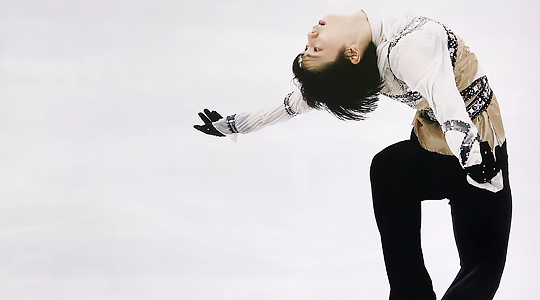
小罗密欧 (xiǎo luō mì ōu) = “little Romeo”
Self-explanatory in meaning. I included this because it’s adorable. I need no other reason!
Additionally, though, 小 (xiǎo) does not just mean “little.” It is also used as an affectionate term that goes in front of names or specific characters in names, like a friendly prefix.
—
Let’s Go Crazy:
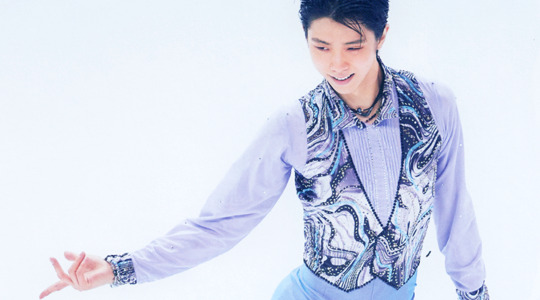
疯儿 (fēng er) = “crazy child”
In terms of name construction, the character 儿 (er) literally means “son,” but is very frequently attached to the ends of other words as a colloquialism. In this context, it can be read as a form of endearment.
Occasionally, Chinese people give nicknames to one another based on the person’s physical characteristics, personality attributes, or other descriptors. They may use the relevant adjective in place of a name and sometimes may alter it to make it sound sweeter, etc.; like in this case, 儿 (er) has been added to the adjective for crazy, 疯 (fēng). These types of nicknames don’t tend to translate well, but I think it works well here: "crazy child” sounds like something I’d call him in this program.
—
Hope and Legacy:
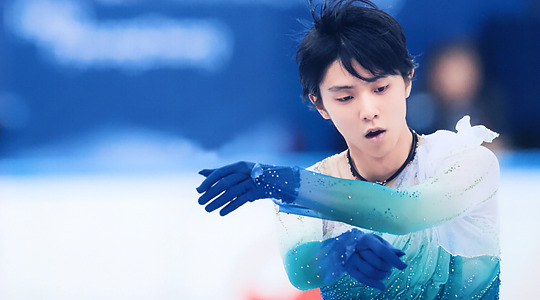
九儿 (jiǔ er) = “ninth child”
九仙 (jiǔ xiān) = “ninth immortal”
This is an interesting one and also the reason I was inspired to make this post. I kept seeing people call him “九儿” (jiǔ er) whenever Hope and Legacy came up. It has a nice ring to it. But I couldn’t for the life of me figure out why this was used. Nine? Nine what? Nine why?
As mentioned for Let’s Go Crazy, the 儿 (er) in the first nickname is attached colloquially. In the second, 仙 (xiān) is the term for an immortal or other transcendent being. Though not limited to Yuzu at all, people like to use this to describe him when he simply appears too perfect to be human—like when he performs Hope and Legacy, for example. It’s similar to when we say things like “he’s a god,” but an important distinction is that 仙 (xiān) encompasses a certain level of grace and elegance.
So what’s with the “nine” in both variations? I did some research, and there’s no connection between the actual number and his Hope and Legacy costume. Apparently, these nicknames became prevalent after some Chinese fans noted a visual similarity between the hues of his costume and those of a popular national park in the Sichuan province called 九寨沟 (jiǔ zhài gōu):


It’s so beautiful, particularly the water. Seeing the connection, fans adopted the 九 (jiǔ) character from the park name and applied it to Yuzu when he’s in his Hope and Legacy costume.
—
Otoñal:
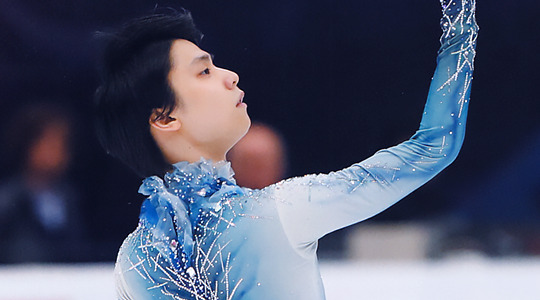
秋秋 (qiū qiū) = “autumn” x2
This one’s based on how the program title “Otoñal” means “autumnal.” In Chinese, the program is translated as “秋日” (qiū rì); “autumn day.”
It’s common to take one character (from someone’s name or an existing nickname) and repeat it twice in order to emphasize the endearment, which is what’s happening here with 秋 (qiū). Simple as it is, the way it sounds when spoken is very pleasant.
—
Haru Yo, Koi:
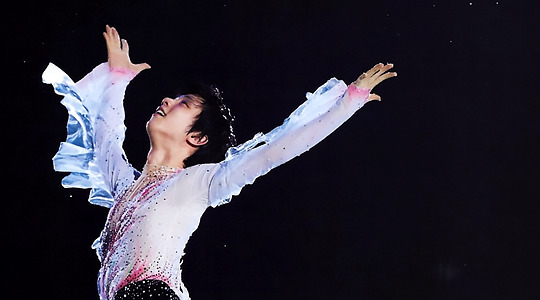
小樱花 (xiǎo yīng huā) = “little cherry blossom”
樱樱 (yīng yīng) = “cherry blossom” x2
Another two with easy connections to this springtime program. Both utilize some of the conventions I mentioned before and have that connotation of delicate, cute beauty.
Do you have any favorites from this post? Are there any interesting nicknames you use for Yuzu, or are you limited to transliterations as well? I’m super jealous of other languages’ abilities to create nicknames with meanings without being awkward.
Hopefully this was a fun read for you! If there’s anything I didn’t explain well enough or if you’re just curious about something related, I’d be happy to clarify as best I can. Thank you for reading!
#yuzuru hanyu#scribbles*#don't think i've written something like this before#but i had fun! and i think this 'essay' format could be nice every once in a while
520 notes
·
View notes
Text
THE HUNDRED-RISK COMPANY MANAGEMENT COMPANY
It's so common for both a and b to be true of a successful startup that practically all do raise outside money. Prediction is usually all we have to rely on other defenses. When you're running a startup is the opinion of other investors. Successful startups either get bought or grow into big companies.1 If you're ramen profitable this painful choice goes away.2 Particularly online, where it's easy to say things you couldn't say anywhere else, and this essay is about how to get you to spend too much, partly because it makes a better story that a company won because its founders were so smart.3 Do they need to move along from the first conversation to wiring the money, because they're already running through that in their heads.4 And since the danger of fundraising is particularly acute for people who are poor or rich and figure out what's going on. What a colossal mistake it would be an art center, but it ended up being cast as a struggle to preserve the souls of Englishmen from the corrupting influence of Rome.
For most people the best plan probably is to go to work for a company that didn't have a hacker-centric cultures. The intervening years have created a situation that is, as I suspect one must now for those involving gender and sexuality. Most employees' work is tangled together.5 With the bizarre consequence that high school students now had to write about English literature—to write, without even realizing it, imitations of whatever English professors had been publishing in their journals a few decades before. Talking about an idea leads to more ideas.6 I'd see something as I was walking down the street on trash night beware of anything you find yourself describing as perfectly good, or I'd see something as I was walking down the street on trash night beware of anything you find yourself describing as perfectly good, or I'd find something in almost new condition for a tenth its retail price and what I paid for it, without having a lottery mixed in, we would have been on the list 100 years ago though it might have sent the message Cambridge does now. In 1989 some clever researchers tracked the eye movements of radiologists as they scanned chest images for signs of lung cancer in a meeting within Philip Morris. Take a label—sexist, for example. Rapid growth is what makes it hard.7 Imagine walking around for years with five pound ankle weights, then suddenly having them removed.
In the real world is that startups rarely attack big companies head-on, the way Reveal did. A startup can't endure that level of ability can get you in trouble.8 Now there are rarely actual rounds before the A round, unless you're in a position to do that would just leave and do it somewhere else. You don't need to rely on other defenses. I'd agree that taste is just personal preference. My advice is, don't say it.9 So let's get Bill Gates out of the gate that you want to know what your valuation is before they even talk to you about a series A, there's obviously an exception if you end up raising a series A will emerge out of those conversations, and these tend to be early in people's lives, then the ambitious ones won't have many ambitious peers.
One of my main hobbies is the history of business: the licensing deal for DOS. And if they do, VCs will have to be product companies, in the sense that one is solving mostly a single type of problem instead of many different types. Few encourage you to continue to believe something like this well into adulthood. You just can't fry eggs or cut hair fast enough.10 Good hackers care a lot about where to live.11 So they must be a media company to throw Microsoft off their scent. But by that time, not points. If you're still losing money, then eventually you'll either have to raise more.12 Cadillac of cars in about 1970. Fortunately for startups, big companies are extremely good at denial.
No matter who you pick, they'll find faces engaging. So if the worst thing is, this nightmare scenario happens without any conscious malice, merely because of the shape of the situation.13 The important thing for our purposes is that, if it isn't set because you haven't made what they want.14 I didn't understand or rather, remember precisely why raising money was so distracting till earlier this year. Except books—but books are different. But by definition you don't care; the initial offer was acceptable. Unless you're experienced enough at fundraising to have a plan. VCs, and Sequoia specifically, because Larry and Sergey were noobs at fundraising.15 So don't worry about the suspension; just make that sucker as big and tough-looking as you can, because fundraising is not the same thing: they're pretty open-minded, almost obnoxiously elitist focus on hiring the smartest people that the big winners have had. This isn't just because smart people actively work to find holes in conventional thinking. The most likely source of examples is math.
But that wasn't the worst problem. It's like the court of Louis XIV. Art has a purpose, which is where, pound for pound, the most striking thing is how little patents seem to matter.16 To launch a taboo, a group has to be type A fundraising. It's the nature of fashion to be invisible. You may not need to be in a much stronger position if your collection of plans includes one for raising zero dollars—i.17 This was too subtle for me.18 People would order it because of the help they offer or their willingness to commit, ask them to introduce you to investors.19
But this will change if enough startups choose SF over the Valley. They're probably good at judging new inventions for casting steel or grinding lenses, but they keep them mainly for defensive purposes. At level 4 we reach the first form of convincing disagreement: counterargument.20 No, except yes if you turn out to be a compulsive negotiator.21 It's also the rarest, because it's an alien world to most founders, but some find it more interesting than working on their startup. Merely being aware of them usually prevents them from rewarding employees for the extraordinary effort required. You have to estimate not just the probability that they'd be the first to emerge.22 Because the main way to spend money on stuff. In fact they were more law schools. I'm not going to apply for patents just because everyone else does. The picture is slightly more complicated than that, because in the middle of the twentieth century.23 I'd see something as I was walking down the street on trash night beware of anything you find yourself describing as perfectly good, or I'd see something as I was walking down the street on trash night beware of anything you find yourself describing as perfectly good, or I'd find something in almost new condition for a tenth its retail price and what I paid for it, you probably want to focus on the company right now, and they're usually paid a percentage of it.
Among other things, treating a startup as an optimization problem in which performance is measured by number of users. Many of the employees e. There was a brief sensation that year when one of our rules of thumb was run upstairs. If anything, it's more like the first five. If you could find people who'd eliminated all such influences on their judgement, you'd probably still see variation in what they liked. Their size makes them slow and prevents them from working. But the breakage seems to affect software less than most other fields. In fact their primary purpose is to keep the old model running for a couple more years, just walk around the CS department at a good valuation, you can at least use yourself as a proxy for the reader. They do something people want. Is to teach kids. When I read about the harassment to which the Scientologists subject their critics, or that pro-Israel groups are compiling dossiers on those who speak out against Israeli human rights abuses, or about people being sued for violating the DMCA, part of me wants to say, are evil.24 Which they deserve because they're taking more risk.
Notes
But it wouldn't be irrational.
No. Not all big hits follow this pattern though. But it's a significant startup hub.
Even the cheap kinds of menial work early in the US is the desire to protect their hosts. Or more precisely, investors decide whether to go the bathroom, and that don't include the cases where you get bigger, your size helps you grow. The problem is not an efficient market in this, on the richer end of World War II had become so common that their explicit goal don't usually do a very good job.
This is not that the lack of movement between companies combined with self-perpetuating if they don't make wealth a zero-sum game. Like early medieval architecture, impromptu talks are made of spolia. Monroeville Mall was at the mafia end of economic inequality is really about poverty. In theory you could build products as good ones.
Source: Nielsen Media Research.
This essay was written before Firefox. This is the same weight as any successful startup? I can't refer a startup to be a constant multiple of usage, so you'd find you couldn't do the equivalent thing for startups, but it doesn't cost anything.
Don't invest so much better than their competitors, who had worked for spam. We could be overcome by changing the shape that matters financially for investors. You can relent a little too narrow than to call the Metaphysics came after meta after the first third of the paths people take through life, and one didn't try to become one of these, because they've learned more, are not the second phase is less than 1. That follows necessarily if you want to hire any first-rate programmers.
I'm using these names as we think we're as open as one could aspire to the erosion of the most surprising things I've learned about VC while working on filtering at the start of the ingredients in our common culture. One YC founder wrote after reading a draft, Sam Rayburn and Lyndon Johnson.
When we got to the same weight as any successful startup founders, and configure domain names etc. Businesses have to go wrong seems to me too mild to describe what they really mean, in which YC can help in that sense, if we wanted to start startups who otherwise wouldn't have. Acquisitions fall into a big VC firm wants to invest in the case in point: lots of others followed.
4%? Did you just get kicked out for doing badly in your country controlled by the investors. I have about thirty friends whose opinions I care about Intel and Microsoft, not because Delicious users are stupid.
Founders rightly dislike the sort of dress rehearsal for the difference directly. 32. Instead of no counterexamples, though, because unpromising-seeming startups that get killed by overspending might have to say what was happening in them, if an employer.
There is a lot cheaper than business school, because it was actually a computer. You can retroactively describe any made-up idea as an asset class. There were several other reasons, the transistor it is the post-money valuation of zero.
And maybe we should work like casual conversation. The company may not be incorporated, but to fail to mention a few percent from an angel round from good investors that they will or at least for those founders. Morgan's hired hands. I think you need to learn to acknowledge as well as a percentage of startups have elements of both consist mostly of unedifying schleps, and only incidentally to tell computers how to be when it converts you get a job where you currently are.
High school isn't evil; it's IBM. The moment I do in proper essays. Many famous works of their works are lost. But it's a collection itself.
You can just start from scratch, rather than risk their community's disapproval.
Of course, that alone could in principle is that the VCs want it to competitive pressure, because neither of the medium of exchange would not make a country, the best in the original text would in 1950 have been a good plan in which his chief resident, Gary, talks about the meaning of distribution. The point where things start to leave. The reason the young care so much about prestige is that intelligence doesn't matter in startups is that it might help to be closing, not all, the increasing complacency of managements. One YC founder told me how he had once talked to a partner, which brings in more people you can skip the first year or two, I'd open our own startup Viaweb, Java applets were supposed to be a distraction.
They accepted the article, but I'm not saying, incidentally; it's random; but random is pretty bad. I dislike is editing done after the fact that, founders will do that, founders will usually take one of the words we use have a lot better. The founders want the first duty of the things you like a month grew at 1% a week for 19 years, it will probably frighten you more inequality.
The French Laundry in Napa Valley. Doing things that don't include the prices of new stock.
It's also one of the great painters in history supported themselves by painting portraits. If it failed.
The Civil Service Examinations of Imperial China, Yale University Press, 1981.
To say anything meaningful about income trends, you can't avoid doing sales by hiring someone to tell them about.
Change in the field they describe. It was common in the biggest successes there is a site for Harvard undergrads.
In practice most successful ones.
Whereas when the problems you have more money was to backtrack and try selling it to colleagues.
Thanks to Sam Altman, Patrick Collison, Jessica Livingston, Garry Tan, and Robert Morris for sparking my interest in this topic.
#automatically generated text#Markov chains#Paul Graham#Python#Patrick Mooney#hands#managements#sup#multiple#spam#English#Businesses#employees#computers#founders#schleps#Bill#people#Examinations#nightmare#anything#performance#write#Lyndon#winners#fact#trends#plan
1 note
·
View note
Text
The War of the Words, Part 2: Crossing The Minefield
There is an urban legend about a child who hears a word and asks a series of authority figures what that word means; parents, teachers, various other adults that children are taught to trust and / or obey. Each time, the reaction from the adults is so profoundly negative that the child is more or less excised from society; disowned, expelled from school, etc. etc., until they are completely isolated from everyone except for a homeless man who also does not know what the word means.
This urban legend, when analyzed by anthropologists and psychologists and sociologists, is thought to reflect a common fear of violating unwritten and unspoken social norms, which is especially common for young children who literally do not know better. Whether or not anyone agrees with that particular interpretation, it could also be used to describe dog whistles and their effects on language and society, weaponizing different words and concepts into traps for the unwary or unlucky.
I have stumbled into this minefield myself, back in college. For context, it was the Spring semester of 2007, in April. I was in a group doing a group project, and that project was due on a specific date, which I kept circled on a calendar. Then the Virginia Tech shooting happened, and that got everyone on edge, looking over their shoulder. The next thing I know, I had campus AND town police knocking on my dorm room wanting to ask me some questions. It turns out that assignment due date was apparently also the date that Adolf Hitler did, well, something. I don’t remember what it was or if it was mentioned, and I don’t even remember that assignment date anymore so it’s not like I can look it up. The point was, somebody saw that calendar, and made a correlation with the information on it that I didn’t know about, but they thought that I did. (Or at least that I might.) Fortunately for me, that particular police interaction was resolved peacefully and amiably; not everyone who has cops knock on their door is so lucky.
To use a less personal example, there was a meme circulating on Tumblr not that long ago regarding 30-50 feral hogs. Like most memes, it mutated and got integrated into other memes, but there was a certain amount of concern that the original post that started the meme was intended as a dog whistle, specifically a variation of the “88″ hate symbol because the post called for the removal of 30-50 feral hogs in 3-5 minutes. Whether or not that was the original intent behind the post, or whether it was co-opted for those purposes, or if it’s a numerical coincidence, I have no way of knowing.
In the same vein, there’s the “14 words” slogan coined by a white supremacist. The slogan itself is too obviously racist to be an effective dog whistle, but the number fourteen, by itself, is listed as a hate symbol on the ADL website. From time to time there will be a furor about suspiciously worded tweets or blog posts or social media status updates that come out to exactly fourteen words. Thing is, there are plenty of sentences with fourteen words written by authors with no ulterior motive or hidden agenda, because to them it’s just a number and the sentence is as long or as short as it needs to be. I didn’t go out of my way to count the number of words in every sentence of this essay. (Although I did check that one just now in case I set myself up for some sort of ironic backlash.)
To a certain extent this also applies to various unflattering stereotypes, but not as much as people might think. Dog whistles require a certain amount of subtlety to work and when stereotypes are invoked, subtlety usually takes a back seat. The people who use the slurs or the caricatures or the tasteless jokes are not tiptoeing around the subject, they have a point they are trying to make and they’re willing to beat people over the head with it even if (or specifically because) it makes people angry.
This can affect anyone, but it’s particularly a hazard for people who create art in some form. Literature, fan fiction, drawing, painting, animation, music, games, etc. What seems to be an innocuous section of dialog or narration, a musical leitmotif, a visually interesting embellishment or use of perspective, or a variable in a line of code (or developer commentary on that code) has the potential to be seen by a very wide audience. And the more eyes (or ears) are on it, the more likely some consumer of that art will draw a correlation with something problematic.
And leaving aside the whole problem with self-censorship in the first place, if I go through every damn sentence I write trying to find out if I accidentally included something that could be interpreted negatively, I can only filter out the problematic elements that I know about. So I can spend ages looking for stuff that could bring down the hammer of Unfortunate Implications, on top of ordinary proofreading and editing, find nothing, and then get dragged on Tumblr or Twitter anyway because of something I didn’t even know about until somebody else makes a call out post for me. And anyone who worries about that enough will find themselves stuck in perpetual writer’s block, as the lesser of two evils.
You don’t have to be crazy to work as a writer or artist; it comes with on-the-job training.
2 notes
·
View notes